The Impact of CRM on Revenue Generation in Hospitality Industry
VerifiedAdded on 2023/01/11
|28
|5775
|40
AI Summary
This research project focuses on analyzing the impact of Customer Relationship Management (CRM) on revenue generation in the hospitality industry, with a case study on Sultan Restaurant, London. It includes chapters on literature review, research methodology, analysis and findings, critical appraisal, recommendations, and conclusion.
Contribute Materials
Your contribution can guide someone’s learning journey. Share your
documents today.
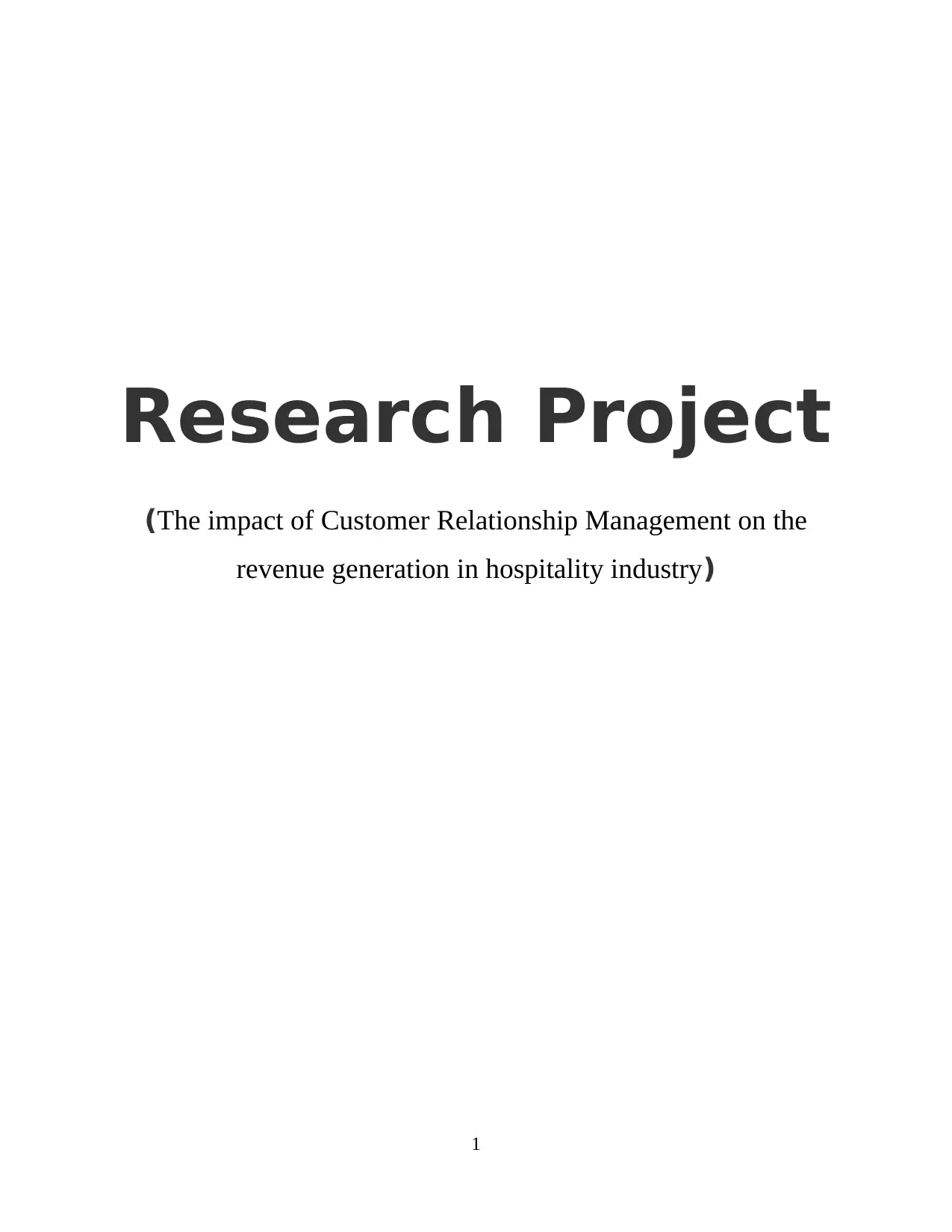
Research Project
(The impact of Customer Relationship Management on the
revenue generation in hospitality industry)
1
(The impact of Customer Relationship Management on the
revenue generation in hospitality industry)
1
Secure Best Marks with AI Grader
Need help grading? Try our AI Grader for instant feedback on your assignments.
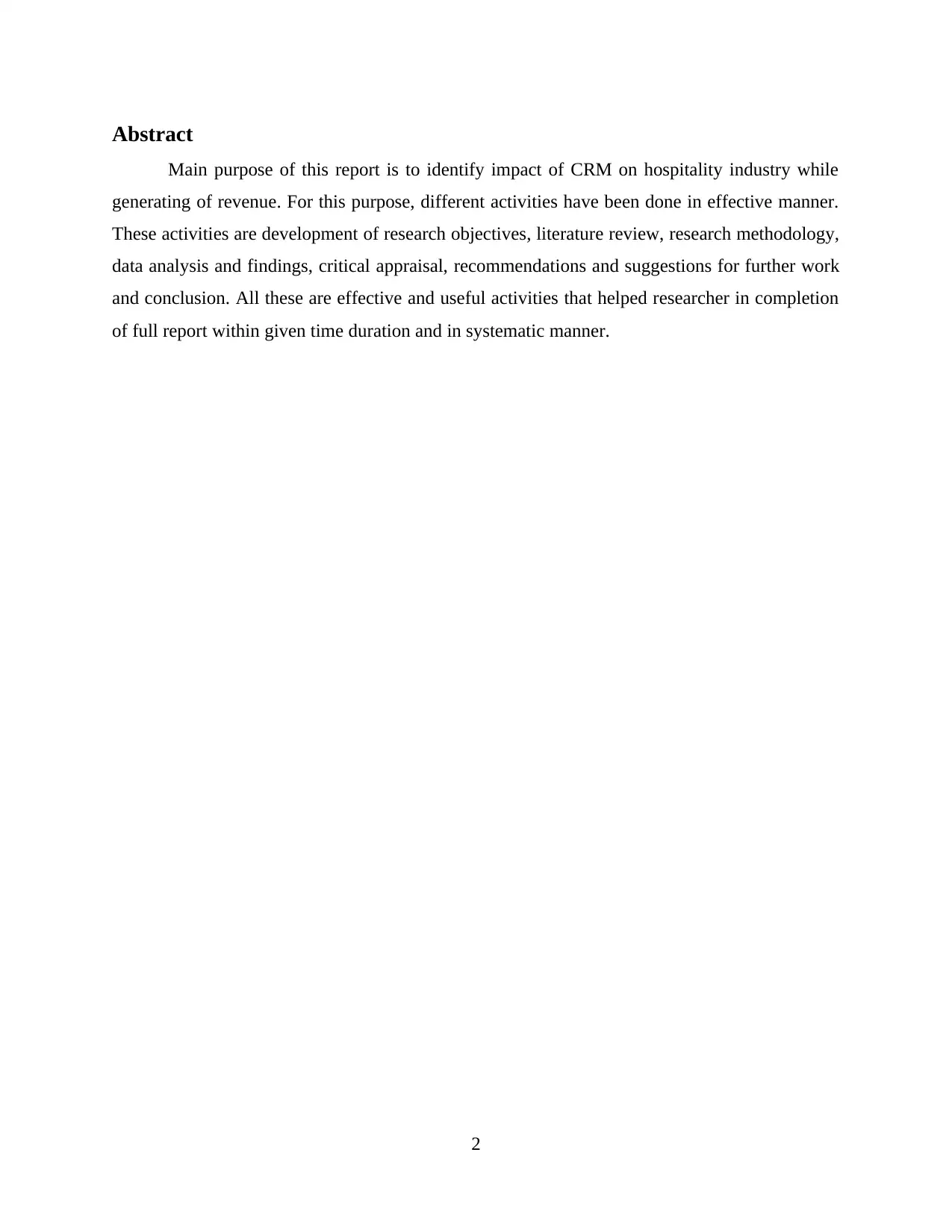
Abstract
Main purpose of this report is to identify impact of CRM on hospitality industry while
generating of revenue. For this purpose, different activities have been done in effective manner.
These activities are development of research objectives, literature review, research methodology,
data analysis and findings, critical appraisal, recommendations and suggestions for further work
and conclusion. All these are effective and useful activities that helped researcher in completion
of full report within given time duration and in systematic manner.
2
Main purpose of this report is to identify impact of CRM on hospitality industry while
generating of revenue. For this purpose, different activities have been done in effective manner.
These activities are development of research objectives, literature review, research methodology,
data analysis and findings, critical appraisal, recommendations and suggestions for further work
and conclusion. All these are effective and useful activities that helped researcher in completion
of full report within given time duration and in systematic manner.
2
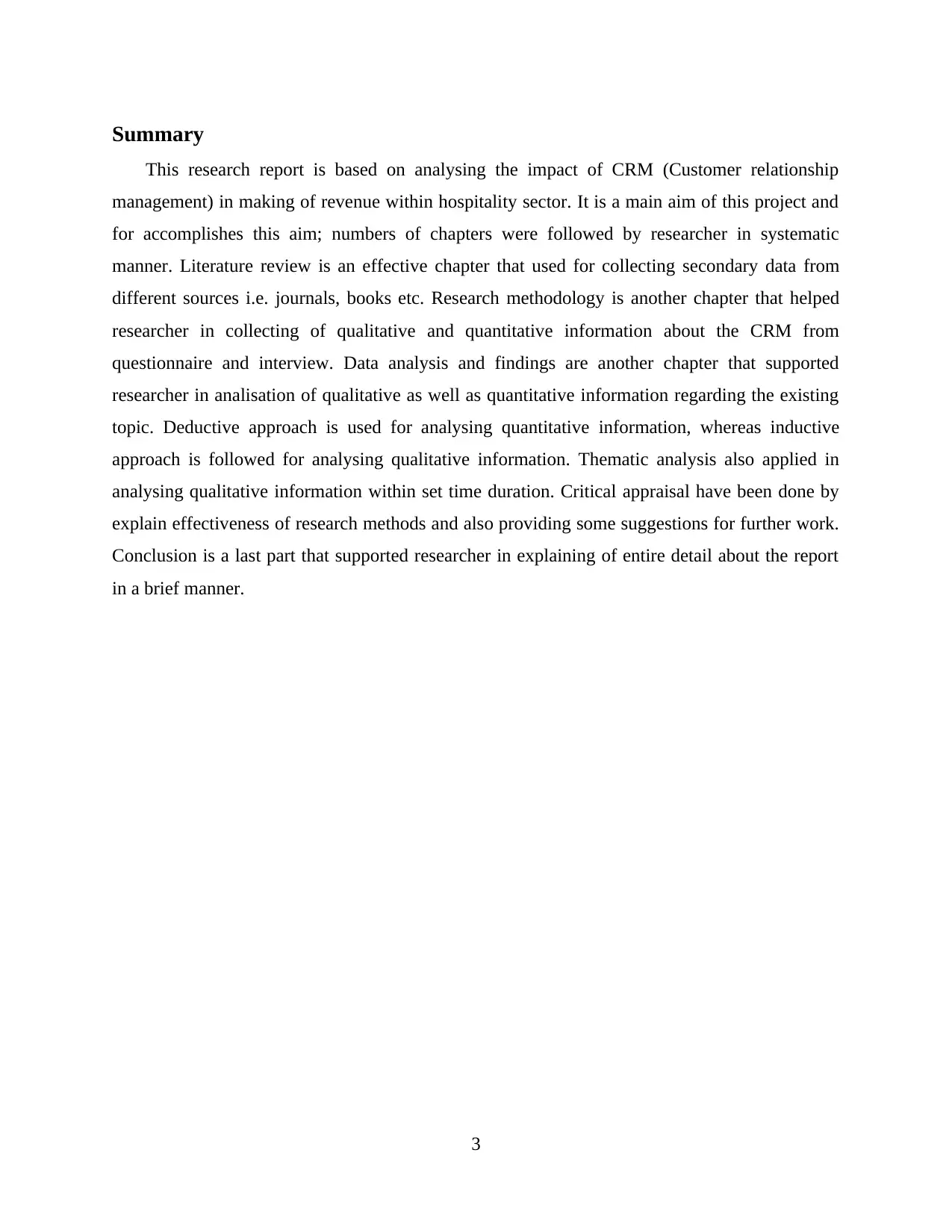
Summary
This research report is based on analysing the impact of CRM (Customer relationship
management) in making of revenue within hospitality sector. It is a main aim of this project and
for accomplishes this aim; numbers of chapters were followed by researcher in systematic
manner. Literature review is an effective chapter that used for collecting secondary data from
different sources i.e. journals, books etc. Research methodology is another chapter that helped
researcher in collecting of qualitative and quantitative information about the CRM from
questionnaire and interview. Data analysis and findings are another chapter that supported
researcher in analisation of qualitative as well as quantitative information regarding the existing
topic. Deductive approach is used for analysing quantitative information, whereas inductive
approach is followed for analysing qualitative information. Thematic analysis also applied in
analysing qualitative information within set time duration. Critical appraisal have been done by
explain effectiveness of research methods and also providing some suggestions for further work.
Conclusion is a last part that supported researcher in explaining of entire detail about the report
in a brief manner.
3
This research report is based on analysing the impact of CRM (Customer relationship
management) in making of revenue within hospitality sector. It is a main aim of this project and
for accomplishes this aim; numbers of chapters were followed by researcher in systematic
manner. Literature review is an effective chapter that used for collecting secondary data from
different sources i.e. journals, books etc. Research methodology is another chapter that helped
researcher in collecting of qualitative and quantitative information about the CRM from
questionnaire and interview. Data analysis and findings are another chapter that supported
researcher in analisation of qualitative as well as quantitative information regarding the existing
topic. Deductive approach is used for analysing quantitative information, whereas inductive
approach is followed for analysing qualitative information. Thematic analysis also applied in
analysing qualitative information within set time duration. Critical appraisal have been done by
explain effectiveness of research methods and also providing some suggestions for further work.
Conclusion is a last part that supported researcher in explaining of entire detail about the report
in a brief manner.
3
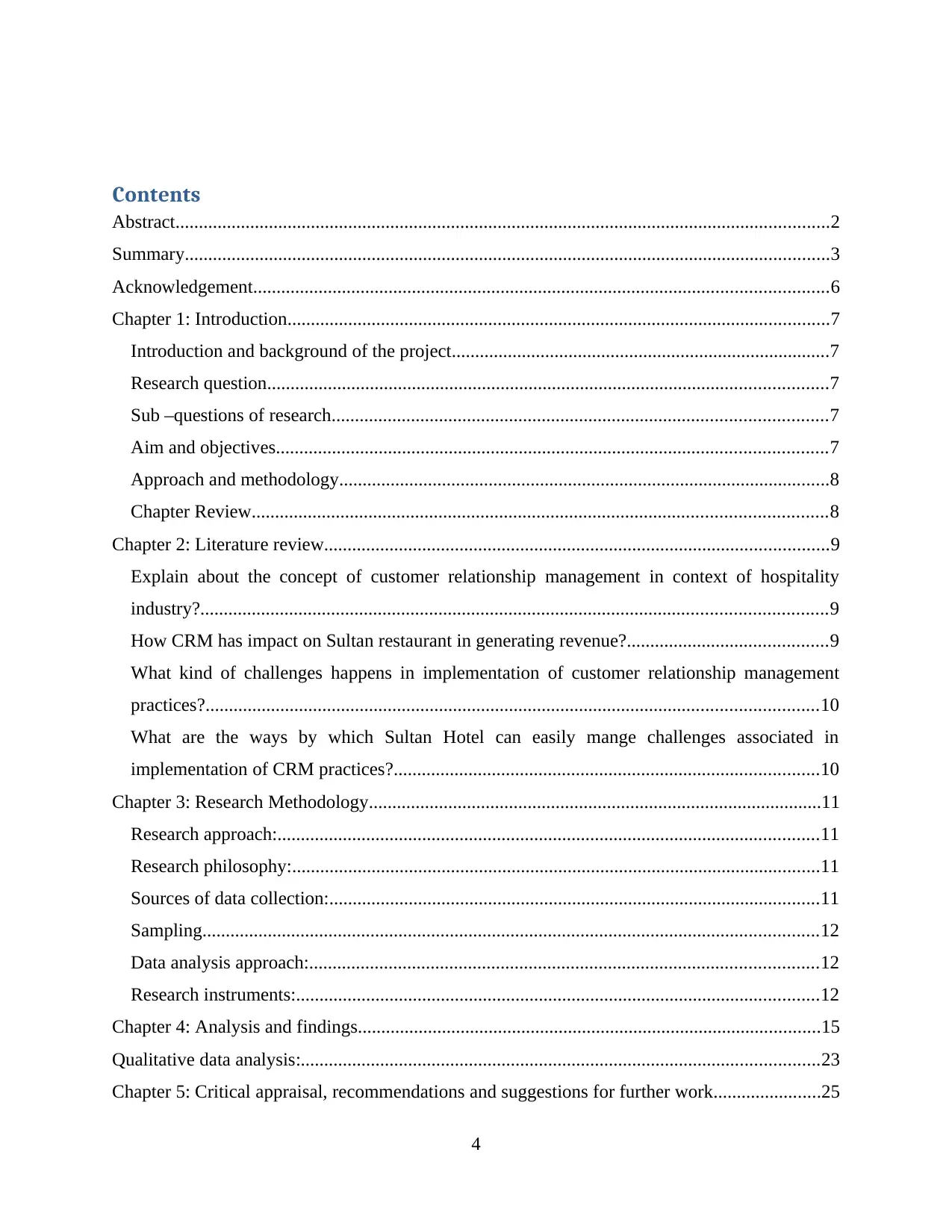
Contents
Abstract............................................................................................................................................2
Summary..........................................................................................................................................3
Acknowledgement...........................................................................................................................6
Chapter 1: Introduction....................................................................................................................7
Introduction and background of the project.................................................................................7
Research question........................................................................................................................7
Sub –questions of research..........................................................................................................7
Aim and objectives......................................................................................................................7
Approach and methodology.........................................................................................................8
Chapter Review...........................................................................................................................8
Chapter 2: Literature review............................................................................................................9
Explain about the concept of customer relationship management in context of hospitality
industry?......................................................................................................................................9
How CRM has impact on Sultan restaurant in generating revenue?...........................................9
What kind of challenges happens in implementation of customer relationship management
practices?...................................................................................................................................10
What are the ways by which Sultan Hotel can easily mange challenges associated in
implementation of CRM practices?...........................................................................................10
Chapter 3: Research Methodology.................................................................................................11
Research approach:....................................................................................................................11
Research philosophy:.................................................................................................................11
Sources of data collection:.........................................................................................................11
Sampling....................................................................................................................................12
Data analysis approach:.............................................................................................................12
Research instruments:................................................................................................................12
Chapter 4: Analysis and findings...................................................................................................15
Qualitative data analysis:...............................................................................................................23
Chapter 5: Critical appraisal, recommendations and suggestions for further work.......................25
4
Abstract............................................................................................................................................2
Summary..........................................................................................................................................3
Acknowledgement...........................................................................................................................6
Chapter 1: Introduction....................................................................................................................7
Introduction and background of the project.................................................................................7
Research question........................................................................................................................7
Sub –questions of research..........................................................................................................7
Aim and objectives......................................................................................................................7
Approach and methodology.........................................................................................................8
Chapter Review...........................................................................................................................8
Chapter 2: Literature review............................................................................................................9
Explain about the concept of customer relationship management in context of hospitality
industry?......................................................................................................................................9
How CRM has impact on Sultan restaurant in generating revenue?...........................................9
What kind of challenges happens in implementation of customer relationship management
practices?...................................................................................................................................10
What are the ways by which Sultan Hotel can easily mange challenges associated in
implementation of CRM practices?...........................................................................................10
Chapter 3: Research Methodology.................................................................................................11
Research approach:....................................................................................................................11
Research philosophy:.................................................................................................................11
Sources of data collection:.........................................................................................................11
Sampling....................................................................................................................................12
Data analysis approach:.............................................................................................................12
Research instruments:................................................................................................................12
Chapter 4: Analysis and findings...................................................................................................15
Qualitative data analysis:...............................................................................................................23
Chapter 5: Critical appraisal, recommendations and suggestions for further work.......................25
4
Secure Best Marks with AI Grader
Need help grading? Try our AI Grader for instant feedback on your assignments.
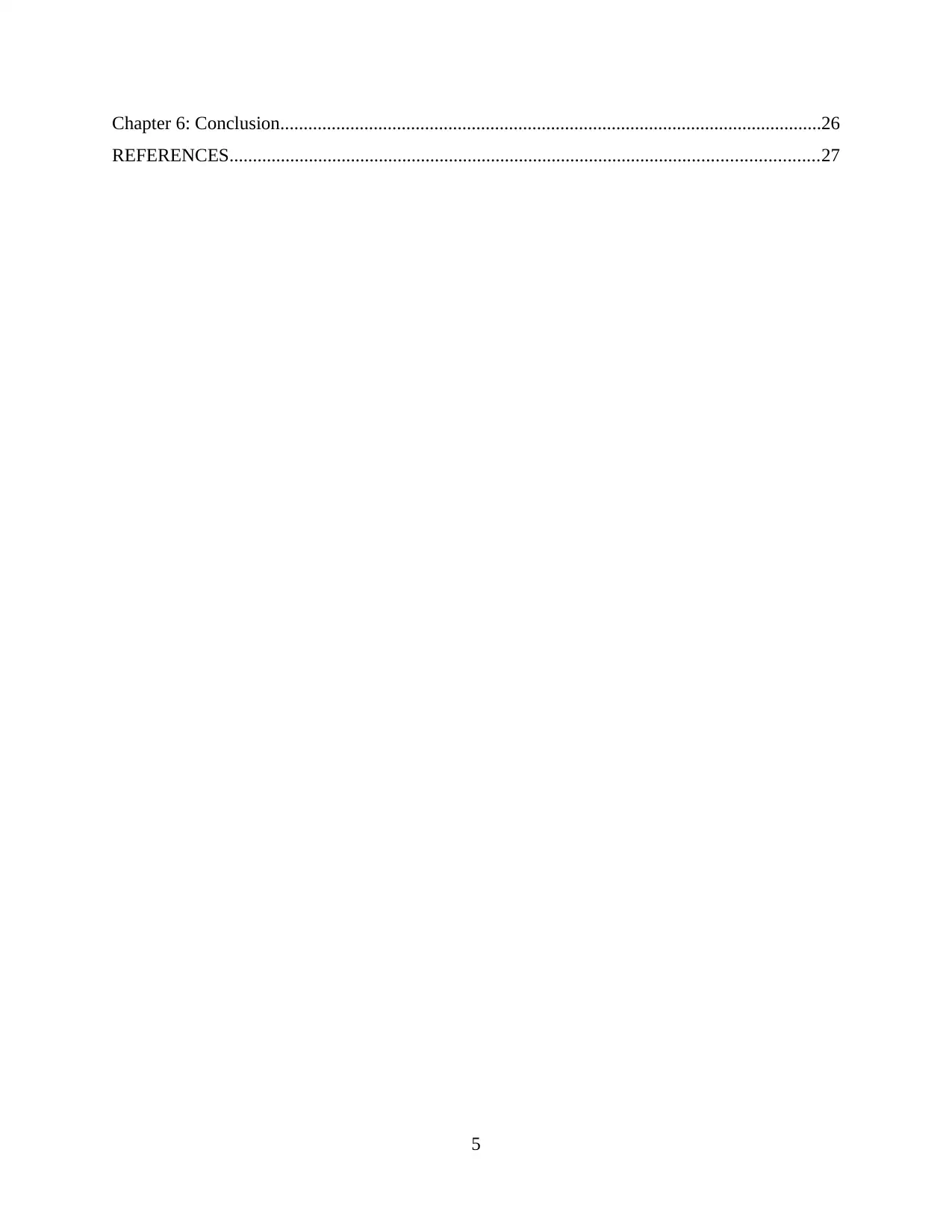
Chapter 6: Conclusion....................................................................................................................26
REFERENCES..............................................................................................................................27
5
REFERENCES..............................................................................................................................27
5
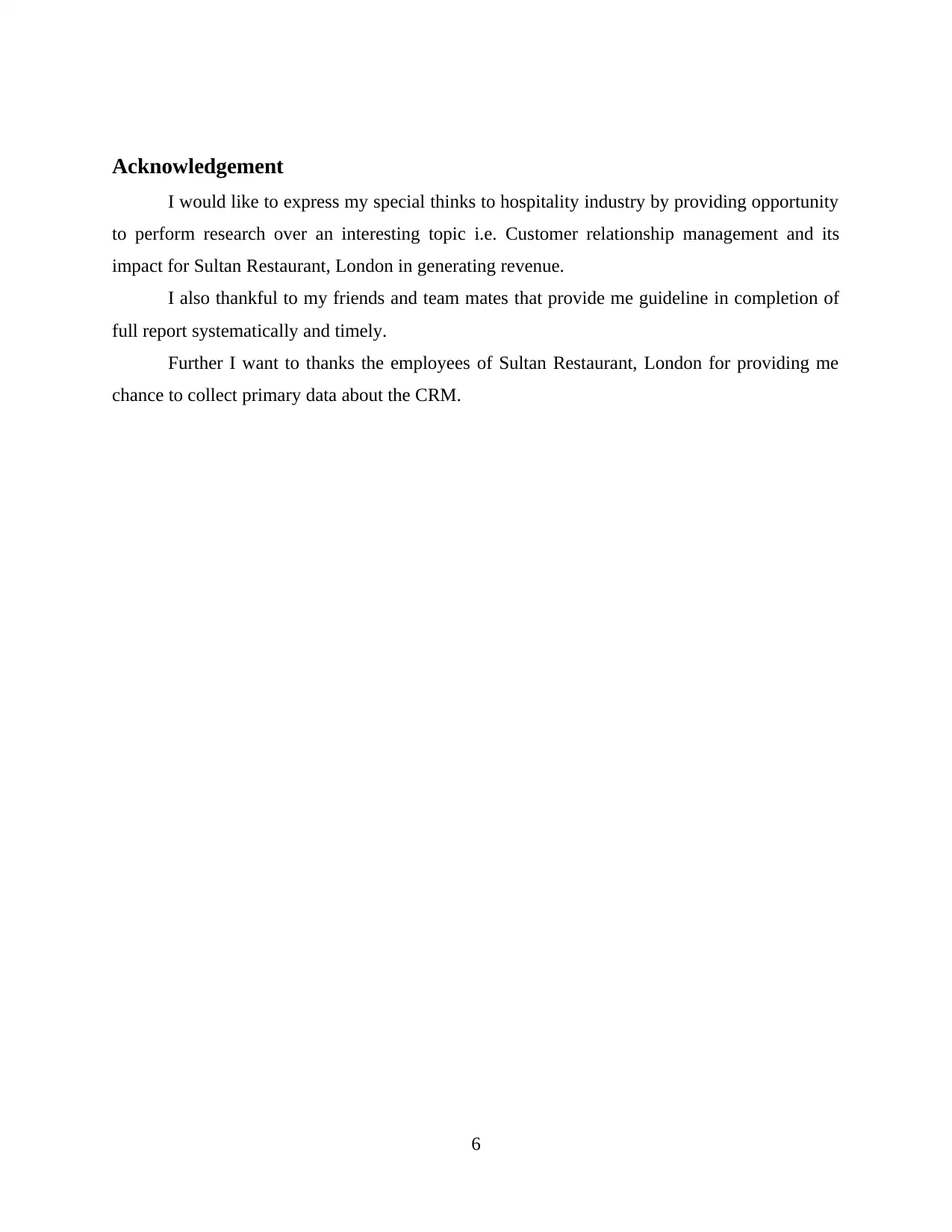
Acknowledgement
I would like to express my special thinks to hospitality industry by providing opportunity
to perform research over an interesting topic i.e. Customer relationship management and its
impact for Sultan Restaurant, London in generating revenue.
I also thankful to my friends and team mates that provide me guideline in completion of
full report systematically and timely.
Further I want to thanks the employees of Sultan Restaurant, London for providing me
chance to collect primary data about the CRM.
6
I would like to express my special thinks to hospitality industry by providing opportunity
to perform research over an interesting topic i.e. Customer relationship management and its
impact for Sultan Restaurant, London in generating revenue.
I also thankful to my friends and team mates that provide me guideline in completion of
full report systematically and timely.
Further I want to thanks the employees of Sultan Restaurant, London for providing me
chance to collect primary data about the CRM.
6
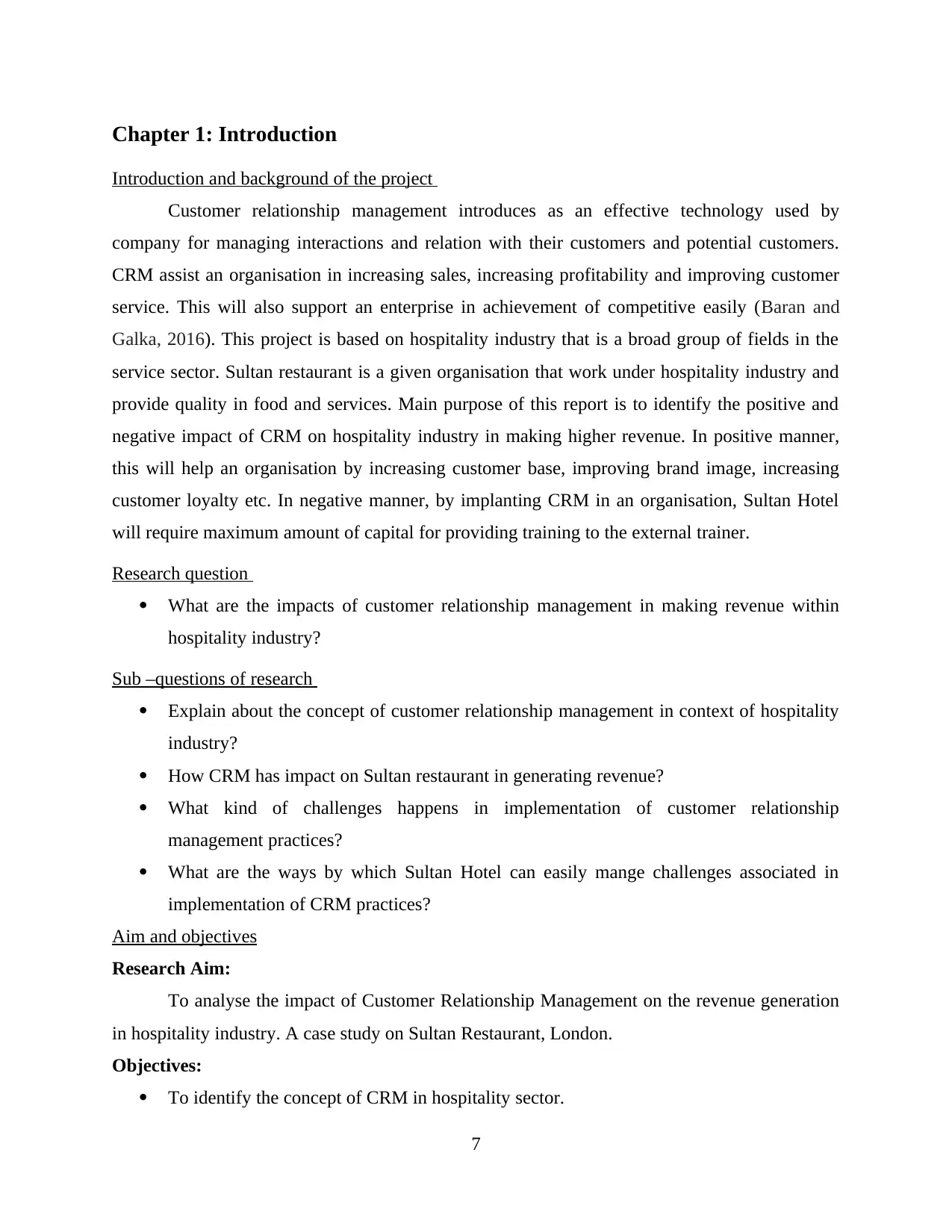
Chapter 1: Introduction
Introduction and background of the project
Customer relationship management introduces as an effective technology used by
company for managing interactions and relation with their customers and potential customers.
CRM assist an organisation in increasing sales, increasing profitability and improving customer
service. This will also support an enterprise in achievement of competitive easily (Baran and
Galka, 2016). This project is based on hospitality industry that is a broad group of fields in the
service sector. Sultan restaurant is a given organisation that work under hospitality industry and
provide quality in food and services. Main purpose of this report is to identify the positive and
negative impact of CRM on hospitality industry in making higher revenue. In positive manner,
this will help an organisation by increasing customer base, improving brand image, increasing
customer loyalty etc. In negative manner, by implanting CRM in an organisation, Sultan Hotel
will require maximum amount of capital for providing training to the external trainer.
Research question
What are the impacts of customer relationship management in making revenue within
hospitality industry?
Sub –questions of research
Explain about the concept of customer relationship management in context of hospitality
industry?
How CRM has impact on Sultan restaurant in generating revenue?
What kind of challenges happens in implementation of customer relationship
management practices?
What are the ways by which Sultan Hotel can easily mange challenges associated in
implementation of CRM practices?
Aim and objectives
Research Aim:
To analyse the impact of Customer Relationship Management on the revenue generation
in hospitality industry. A case study on Sultan Restaurant, London.
Objectives:
To identify the concept of CRM in hospitality sector.
7
Introduction and background of the project
Customer relationship management introduces as an effective technology used by
company for managing interactions and relation with their customers and potential customers.
CRM assist an organisation in increasing sales, increasing profitability and improving customer
service. This will also support an enterprise in achievement of competitive easily (Baran and
Galka, 2016). This project is based on hospitality industry that is a broad group of fields in the
service sector. Sultan restaurant is a given organisation that work under hospitality industry and
provide quality in food and services. Main purpose of this report is to identify the positive and
negative impact of CRM on hospitality industry in making higher revenue. In positive manner,
this will help an organisation by increasing customer base, improving brand image, increasing
customer loyalty etc. In negative manner, by implanting CRM in an organisation, Sultan Hotel
will require maximum amount of capital for providing training to the external trainer.
Research question
What are the impacts of customer relationship management in making revenue within
hospitality industry?
Sub –questions of research
Explain about the concept of customer relationship management in context of hospitality
industry?
How CRM has impact on Sultan restaurant in generating revenue?
What kind of challenges happens in implementation of customer relationship
management practices?
What are the ways by which Sultan Hotel can easily mange challenges associated in
implementation of CRM practices?
Aim and objectives
Research Aim:
To analyse the impact of Customer Relationship Management on the revenue generation
in hospitality industry. A case study on Sultan Restaurant, London.
Objectives:
To identify the concept of CRM in hospitality sector.
7
Paraphrase This Document
Need a fresh take? Get an instant paraphrase of this document with our AI Paraphraser
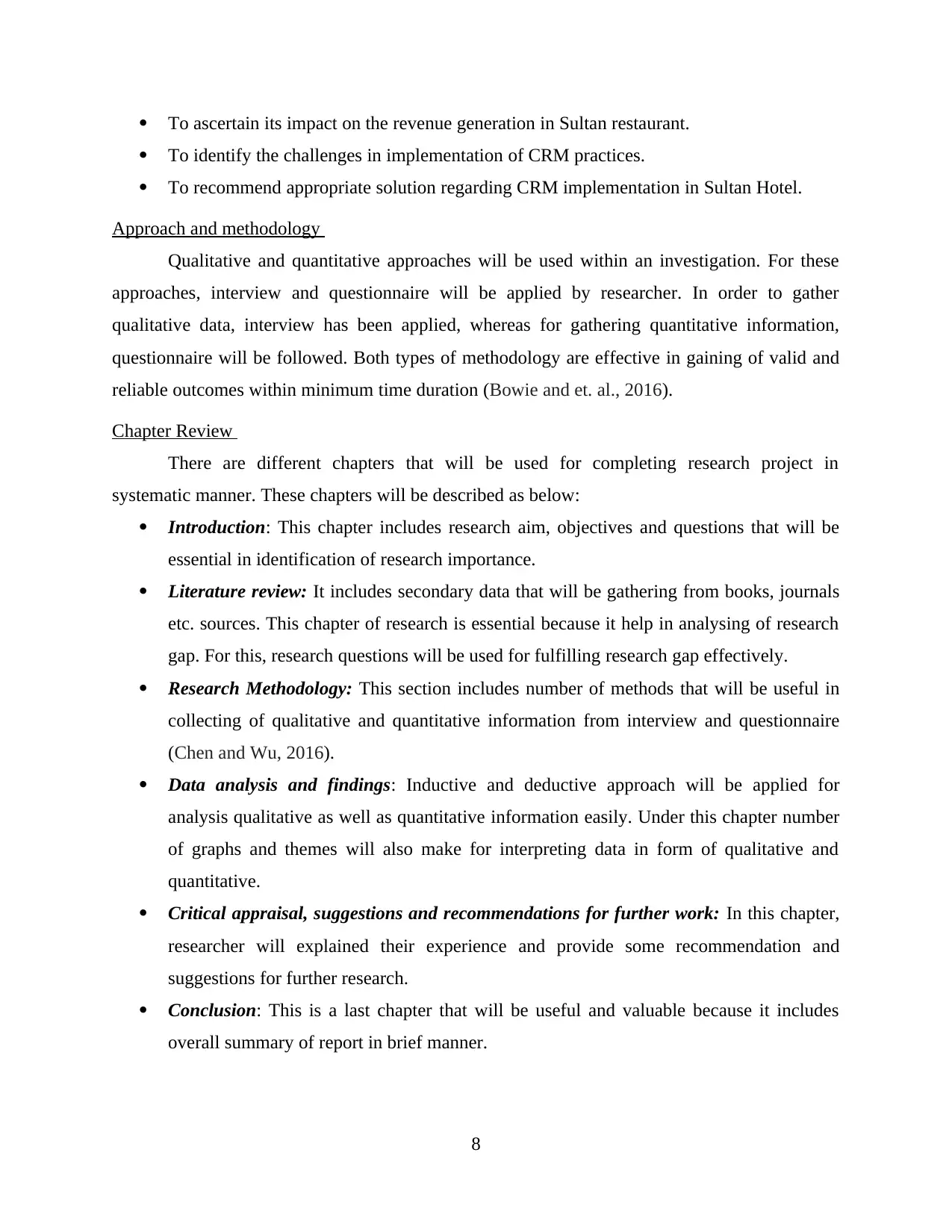
To ascertain its impact on the revenue generation in Sultan restaurant.
To identify the challenges in implementation of CRM practices.
To recommend appropriate solution regarding CRM implementation in Sultan Hotel.
Approach and methodology
Qualitative and quantitative approaches will be used within an investigation. For these
approaches, interview and questionnaire will be applied by researcher. In order to gather
qualitative data, interview has been applied, whereas for gathering quantitative information,
questionnaire will be followed. Both types of methodology are effective in gaining of valid and
reliable outcomes within minimum time duration (Bowie and et. al., 2016).
Chapter Review
There are different chapters that will be used for completing research project in
systematic manner. These chapters will be described as below:
Introduction: This chapter includes research aim, objectives and questions that will be
essential in identification of research importance.
Literature review: It includes secondary data that will be gathering from books, journals
etc. sources. This chapter of research is essential because it help in analysing of research
gap. For this, research questions will be used for fulfilling research gap effectively.
Research Methodology: This section includes number of methods that will be useful in
collecting of qualitative and quantitative information from interview and questionnaire
(Chen and Wu, 2016).
Data analysis and findings: Inductive and deductive approach will be applied for
analysis qualitative as well as quantitative information easily. Under this chapter number
of graphs and themes will also make for interpreting data in form of qualitative and
quantitative.
Critical appraisal, suggestions and recommendations for further work: In this chapter,
researcher will explained their experience and provide some recommendation and
suggestions for further research.
Conclusion: This is a last chapter that will be useful and valuable because it includes
overall summary of report in brief manner.
8
To identify the challenges in implementation of CRM practices.
To recommend appropriate solution regarding CRM implementation in Sultan Hotel.
Approach and methodology
Qualitative and quantitative approaches will be used within an investigation. For these
approaches, interview and questionnaire will be applied by researcher. In order to gather
qualitative data, interview has been applied, whereas for gathering quantitative information,
questionnaire will be followed. Both types of methodology are effective in gaining of valid and
reliable outcomes within minimum time duration (Bowie and et. al., 2016).
Chapter Review
There are different chapters that will be used for completing research project in
systematic manner. These chapters will be described as below:
Introduction: This chapter includes research aim, objectives and questions that will be
essential in identification of research importance.
Literature review: It includes secondary data that will be gathering from books, journals
etc. sources. This chapter of research is essential because it help in analysing of research
gap. For this, research questions will be used for fulfilling research gap effectively.
Research Methodology: This section includes number of methods that will be useful in
collecting of qualitative and quantitative information from interview and questionnaire
(Chen and Wu, 2016).
Data analysis and findings: Inductive and deductive approach will be applied for
analysis qualitative as well as quantitative information easily. Under this chapter number
of graphs and themes will also make for interpreting data in form of qualitative and
quantitative.
Critical appraisal, suggestions and recommendations for further work: In this chapter,
researcher will explained their experience and provide some recommendation and
suggestions for further research.
Conclusion: This is a last chapter that will be useful and valuable because it includes
overall summary of report in brief manner.
8
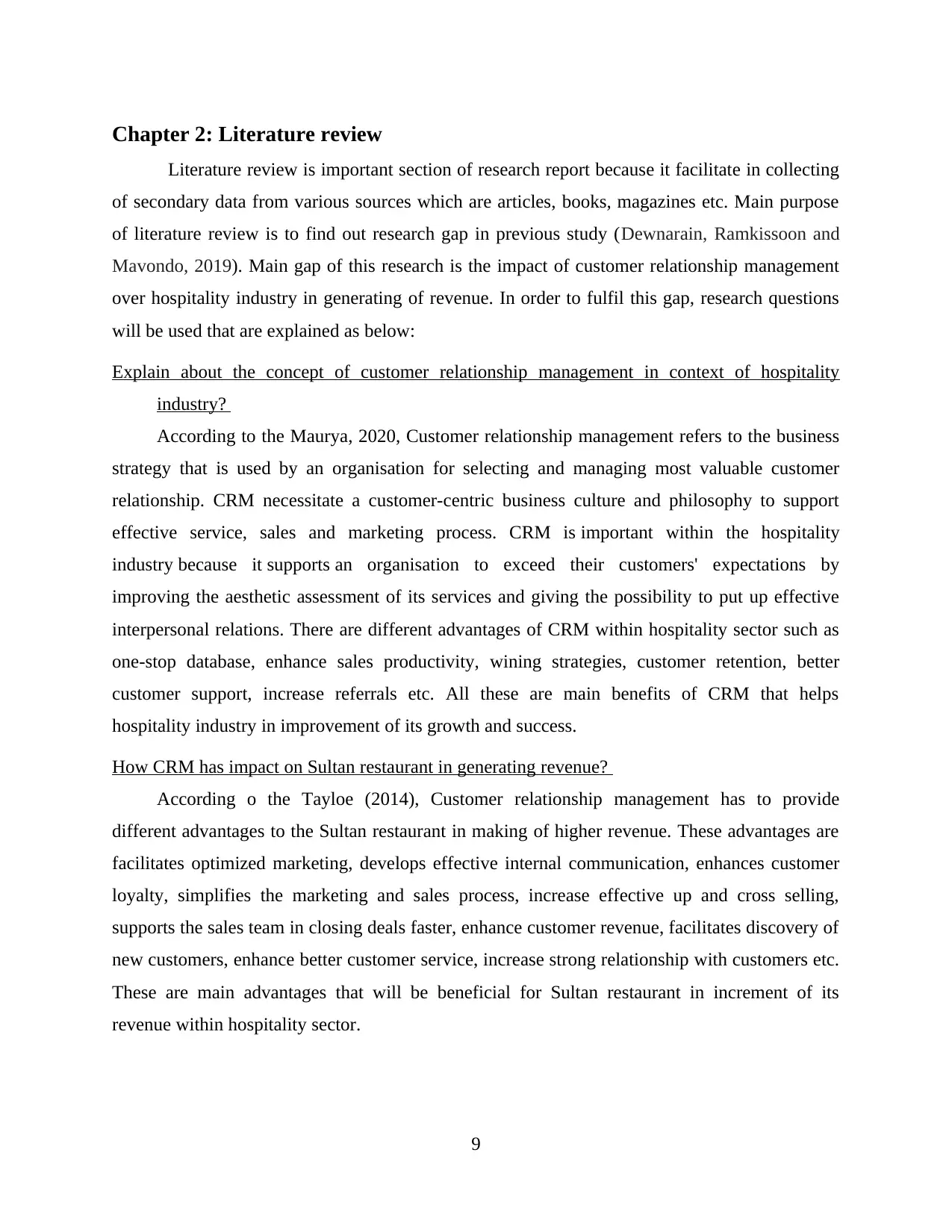
Chapter 2: Literature review
Literature review is important section of research report because it facilitate in collecting
of secondary data from various sources which are articles, books, magazines etc. Main purpose
of literature review is to find out research gap in previous study (Dewnarain, Ramkissoon and
Mavondo, 2019). Main gap of this research is the impact of customer relationship management
over hospitality industry in generating of revenue. In order to fulfil this gap, research questions
will be used that are explained as below:
Explain about the concept of customer relationship management in context of hospitality
industry?
According to the Maurya, 2020, Customer relationship management refers to the business
strategy that is used by an organisation for selecting and managing most valuable customer
relationship. CRM necessitate a customer-centric business culture and philosophy to support
effective service, sales and marketing process. CRM is important within the hospitality
industry because it supports an organisation to exceed their customers' expectations by
improving the aesthetic assessment of its services and giving the possibility to put up effective
interpersonal relations. There are different advantages of CRM within hospitality sector such as
one-stop database, enhance sales productivity, wining strategies, customer retention, better
customer support, increase referrals etc. All these are main benefits of CRM that helps
hospitality industry in improvement of its growth and success.
How CRM has impact on Sultan restaurant in generating revenue?
According o the Tayloe (2014), Customer relationship management has to provide
different advantages to the Sultan restaurant in making of higher revenue. These advantages are
facilitates optimized marketing, develops effective internal communication, enhances customer
loyalty, simplifies the marketing and sales process, increase effective up and cross selling,
supports the sales team in closing deals faster, enhance customer revenue, facilitates discovery of
new customers, enhance better customer service, increase strong relationship with customers etc.
These are main advantages that will be beneficial for Sultan restaurant in increment of its
revenue within hospitality sector.
9
Literature review is important section of research report because it facilitate in collecting
of secondary data from various sources which are articles, books, magazines etc. Main purpose
of literature review is to find out research gap in previous study (Dewnarain, Ramkissoon and
Mavondo, 2019). Main gap of this research is the impact of customer relationship management
over hospitality industry in generating of revenue. In order to fulfil this gap, research questions
will be used that are explained as below:
Explain about the concept of customer relationship management in context of hospitality
industry?
According to the Maurya, 2020, Customer relationship management refers to the business
strategy that is used by an organisation for selecting and managing most valuable customer
relationship. CRM necessitate a customer-centric business culture and philosophy to support
effective service, sales and marketing process. CRM is important within the hospitality
industry because it supports an organisation to exceed their customers' expectations by
improving the aesthetic assessment of its services and giving the possibility to put up effective
interpersonal relations. There are different advantages of CRM within hospitality sector such as
one-stop database, enhance sales productivity, wining strategies, customer retention, better
customer support, increase referrals etc. All these are main benefits of CRM that helps
hospitality industry in improvement of its growth and success.
How CRM has impact on Sultan restaurant in generating revenue?
According o the Tayloe (2014), Customer relationship management has to provide
different advantages to the Sultan restaurant in making of higher revenue. These advantages are
facilitates optimized marketing, develops effective internal communication, enhances customer
loyalty, simplifies the marketing and sales process, increase effective up and cross selling,
supports the sales team in closing deals faster, enhance customer revenue, facilitates discovery of
new customers, enhance better customer service, increase strong relationship with customers etc.
These are main advantages that will be beneficial for Sultan restaurant in increment of its
revenue within hospitality sector.
9
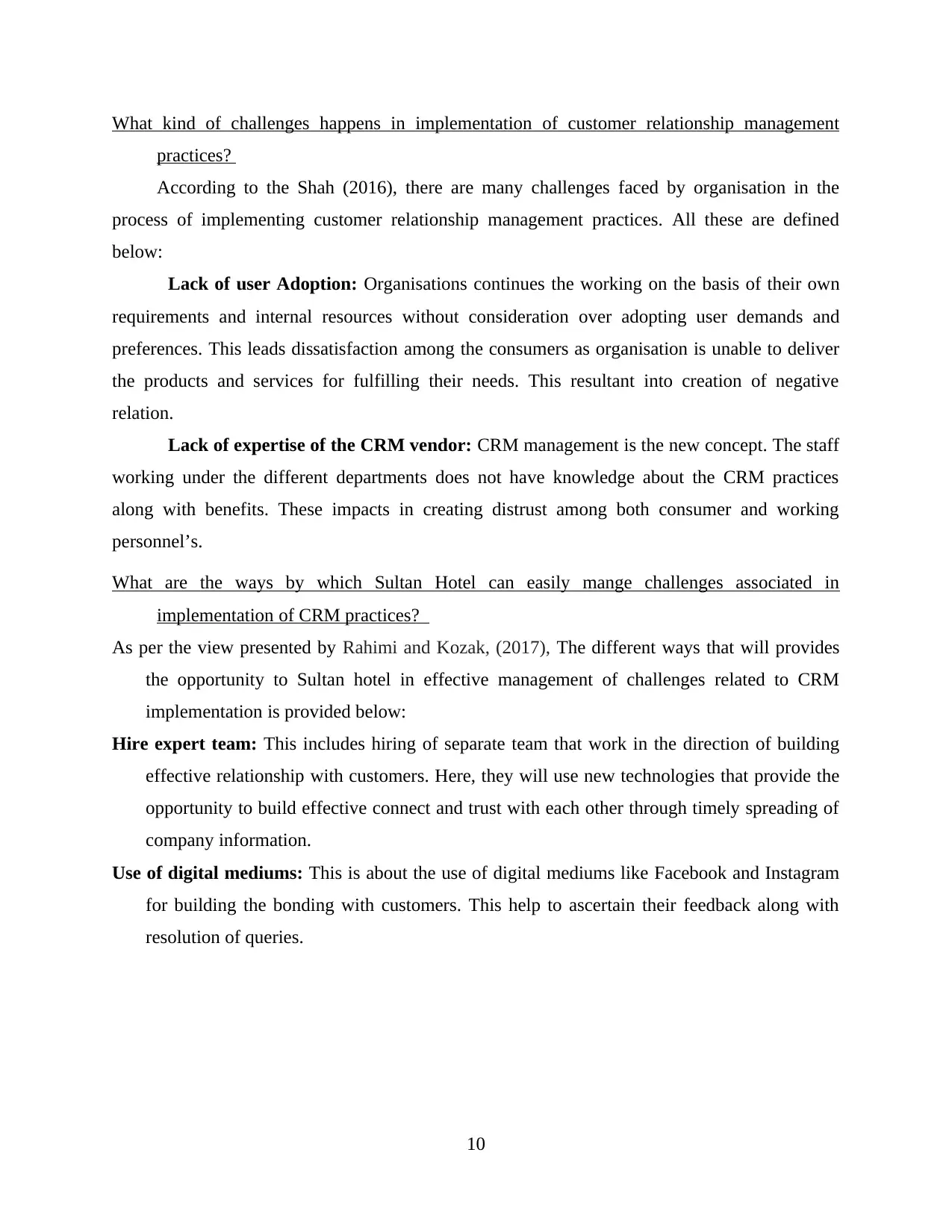
What kind of challenges happens in implementation of customer relationship management
practices?
According to the Shah (2016), there are many challenges faced by organisation in the
process of implementing customer relationship management practices. All these are defined
below:
Lack of user Adoption: Organisations continues the working on the basis of their own
requirements and internal resources without consideration over adopting user demands and
preferences. This leads dissatisfaction among the consumers as organisation is unable to deliver
the products and services for fulfilling their needs. This resultant into creation of negative
relation.
Lack of expertise of the CRM vendor: CRM management is the new concept. The staff
working under the different departments does not have knowledge about the CRM practices
along with benefits. These impacts in creating distrust among both consumer and working
personnel’s.
What are the ways by which Sultan Hotel can easily mange challenges associated in
implementation of CRM practices?
As per the view presented by Rahimi and Kozak, (2017), The different ways that will provides
the opportunity to Sultan hotel in effective management of challenges related to CRM
implementation is provided below:
Hire expert team: This includes hiring of separate team that work in the direction of building
effective relationship with customers. Here, they will use new technologies that provide the
opportunity to build effective connect and trust with each other through timely spreading of
company information.
Use of digital mediums: This is about the use of digital mediums like Facebook and Instagram
for building the bonding with customers. This help to ascertain their feedback along with
resolution of queries.
10
practices?
According to the Shah (2016), there are many challenges faced by organisation in the
process of implementing customer relationship management practices. All these are defined
below:
Lack of user Adoption: Organisations continues the working on the basis of their own
requirements and internal resources without consideration over adopting user demands and
preferences. This leads dissatisfaction among the consumers as organisation is unable to deliver
the products and services for fulfilling their needs. This resultant into creation of negative
relation.
Lack of expertise of the CRM vendor: CRM management is the new concept. The staff
working under the different departments does not have knowledge about the CRM practices
along with benefits. These impacts in creating distrust among both consumer and working
personnel’s.
What are the ways by which Sultan Hotel can easily mange challenges associated in
implementation of CRM practices?
As per the view presented by Rahimi and Kozak, (2017), The different ways that will provides
the opportunity to Sultan hotel in effective management of challenges related to CRM
implementation is provided below:
Hire expert team: This includes hiring of separate team that work in the direction of building
effective relationship with customers. Here, they will use new technologies that provide the
opportunity to build effective connect and trust with each other through timely spreading of
company information.
Use of digital mediums: This is about the use of digital mediums like Facebook and Instagram
for building the bonding with customers. This help to ascertain their feedback along with
resolution of queries.
10
Secure Best Marks with AI Grader
Need help grading? Try our AI Grader for instant feedback on your assignments.
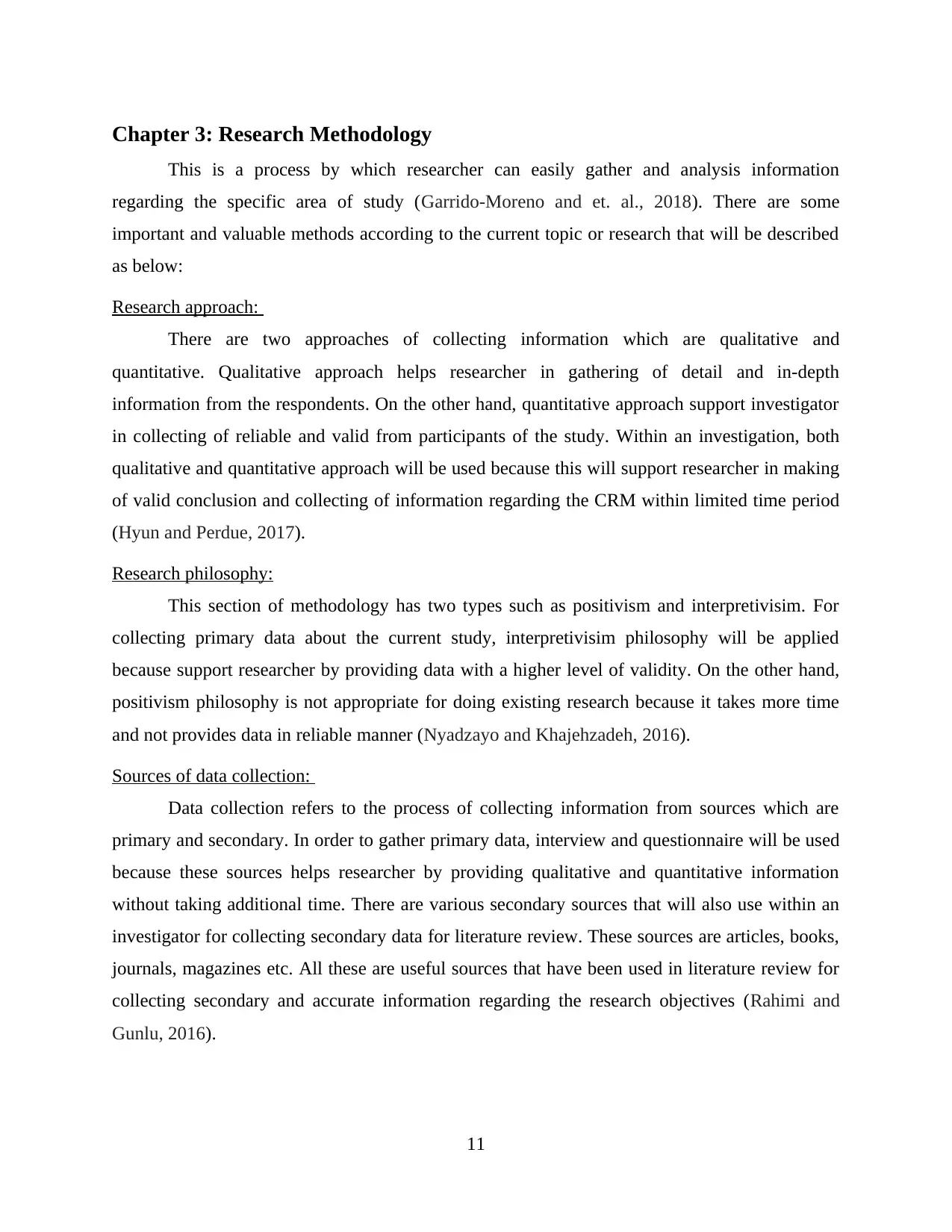
Chapter 3: Research Methodology
This is a process by which researcher can easily gather and analysis information
regarding the specific area of study (Garrido-Moreno and et. al., 2018). There are some
important and valuable methods according to the current topic or research that will be described
as below:
Research approach:
There are two approaches of collecting information which are qualitative and
quantitative. Qualitative approach helps researcher in gathering of detail and in-depth
information from the respondents. On the other hand, quantitative approach support investigator
in collecting of reliable and valid from participants of the study. Within an investigation, both
qualitative and quantitative approach will be used because this will support researcher in making
of valid conclusion and collecting of information regarding the CRM within limited time period
(Hyun and Perdue, 2017).
Research philosophy:
This section of methodology has two types such as positivism and interpretivisim. For
collecting primary data about the current study, interpretivisim philosophy will be applied
because support researcher by providing data with a higher level of validity. On the other hand,
positivism philosophy is not appropriate for doing existing research because it takes more time
and not provides data in reliable manner (Nyadzayo and Khajehzadeh, 2016).
Sources of data collection:
Data collection refers to the process of collecting information from sources which are
primary and secondary. In order to gather primary data, interview and questionnaire will be used
because these sources helps researcher by providing qualitative and quantitative information
without taking additional time. There are various secondary sources that will also use within an
investigator for collecting secondary data for literature review. These sources are articles, books,
journals, magazines etc. All these are useful sources that have been used in literature review for
collecting secondary and accurate information regarding the research objectives (Rahimi and
Gunlu, 2016).
11
This is a process by which researcher can easily gather and analysis information
regarding the specific area of study (Garrido-Moreno and et. al., 2018). There are some
important and valuable methods according to the current topic or research that will be described
as below:
Research approach:
There are two approaches of collecting information which are qualitative and
quantitative. Qualitative approach helps researcher in gathering of detail and in-depth
information from the respondents. On the other hand, quantitative approach support investigator
in collecting of reliable and valid from participants of the study. Within an investigation, both
qualitative and quantitative approach will be used because this will support researcher in making
of valid conclusion and collecting of information regarding the CRM within limited time period
(Hyun and Perdue, 2017).
Research philosophy:
This section of methodology has two types such as positivism and interpretivisim. For
collecting primary data about the current study, interpretivisim philosophy will be applied
because support researcher by providing data with a higher level of validity. On the other hand,
positivism philosophy is not appropriate for doing existing research because it takes more time
and not provides data in reliable manner (Nyadzayo and Khajehzadeh, 2016).
Sources of data collection:
Data collection refers to the process of collecting information from sources which are
primary and secondary. In order to gather primary data, interview and questionnaire will be used
because these sources helps researcher by providing qualitative and quantitative information
without taking additional time. There are various secondary sources that will also use within an
investigator for collecting secondary data for literature review. These sources are articles, books,
journals, magazines etc. All these are useful sources that have been used in literature review for
collecting secondary and accurate information regarding the research objectives (Rahimi and
Gunlu, 2016).
11
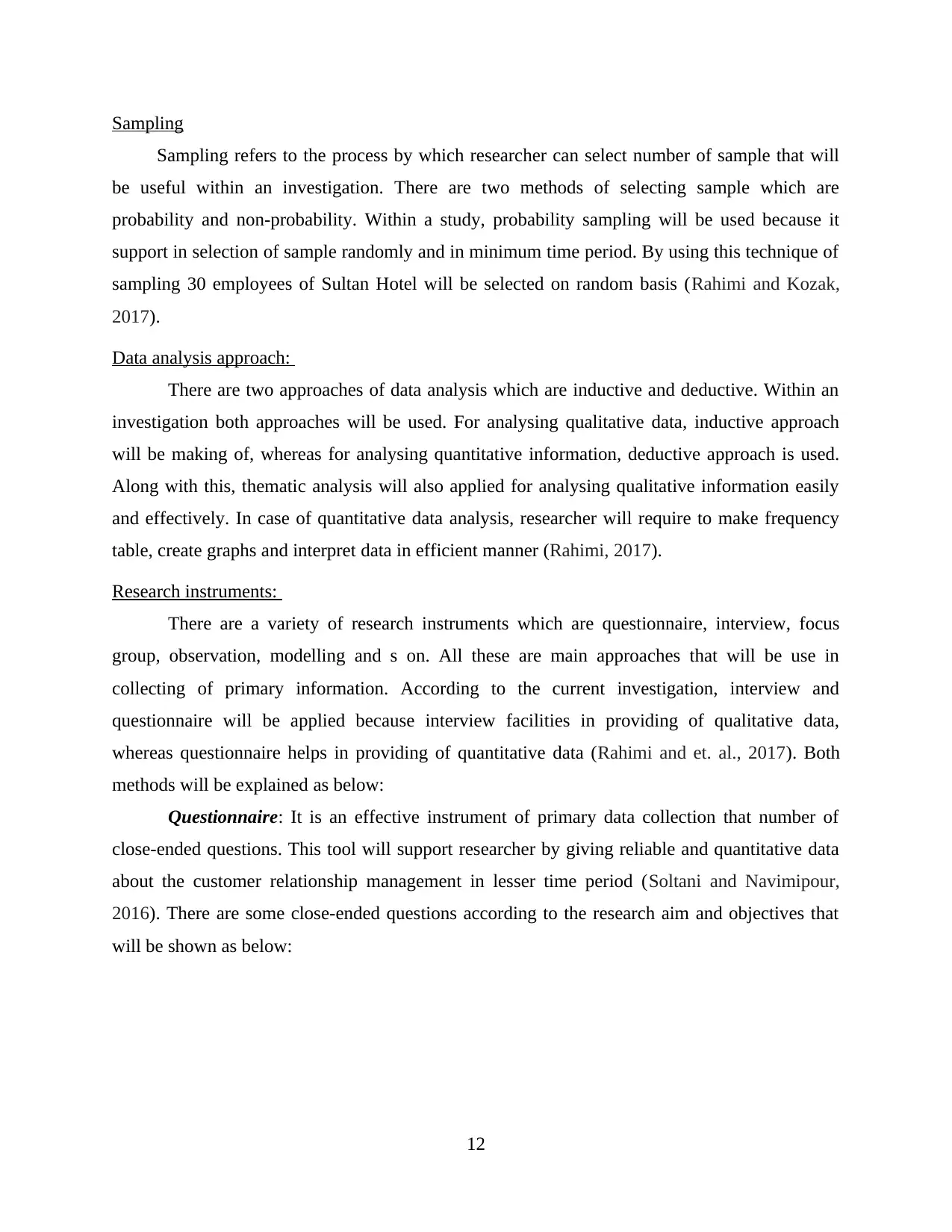
Sampling
Sampling refers to the process by which researcher can select number of sample that will
be useful within an investigation. There are two methods of selecting sample which are
probability and non-probability. Within a study, probability sampling will be used because it
support in selection of sample randomly and in minimum time period. By using this technique of
sampling 30 employees of Sultan Hotel will be selected on random basis (Rahimi and Kozak,
2017).
Data analysis approach:
There are two approaches of data analysis which are inductive and deductive. Within an
investigation both approaches will be used. For analysing qualitative data, inductive approach
will be making of, whereas for analysing quantitative information, deductive approach is used.
Along with this, thematic analysis will also applied for analysing qualitative information easily
and effectively. In case of quantitative data analysis, researcher will require to make frequency
table, create graphs and interpret data in efficient manner (Rahimi, 2017).
Research instruments:
There are a variety of research instruments which are questionnaire, interview, focus
group, observation, modelling and s on. All these are main approaches that will be use in
collecting of primary information. According to the current investigation, interview and
questionnaire will be applied because interview facilities in providing of qualitative data,
whereas questionnaire helps in providing of quantitative data (Rahimi and et. al., 2017). Both
methods will be explained as below:
Questionnaire: It is an effective instrument of primary data collection that number of
close-ended questions. This tool will support researcher by giving reliable and quantitative data
about the customer relationship management in lesser time period (Soltani and Navimipour,
2016). There are some close-ended questions according to the research aim and objectives that
will be shown as below:
12
Sampling refers to the process by which researcher can select number of sample that will
be useful within an investigation. There are two methods of selecting sample which are
probability and non-probability. Within a study, probability sampling will be used because it
support in selection of sample randomly and in minimum time period. By using this technique of
sampling 30 employees of Sultan Hotel will be selected on random basis (Rahimi and Kozak,
2017).
Data analysis approach:
There are two approaches of data analysis which are inductive and deductive. Within an
investigation both approaches will be used. For analysing qualitative data, inductive approach
will be making of, whereas for analysing quantitative information, deductive approach is used.
Along with this, thematic analysis will also applied for analysing qualitative information easily
and effectively. In case of quantitative data analysis, researcher will require to make frequency
table, create graphs and interpret data in efficient manner (Rahimi, 2017).
Research instruments:
There are a variety of research instruments which are questionnaire, interview, focus
group, observation, modelling and s on. All these are main approaches that will be use in
collecting of primary information. According to the current investigation, interview and
questionnaire will be applied because interview facilities in providing of qualitative data,
whereas questionnaire helps in providing of quantitative data (Rahimi and et. al., 2017). Both
methods will be explained as below:
Questionnaire: It is an effective instrument of primary data collection that number of
close-ended questions. This tool will support researcher by giving reliable and quantitative data
about the customer relationship management in lesser time period (Soltani and Navimipour,
2016). There are some close-ended questions according to the research aim and objectives that
will be shown as below:
12
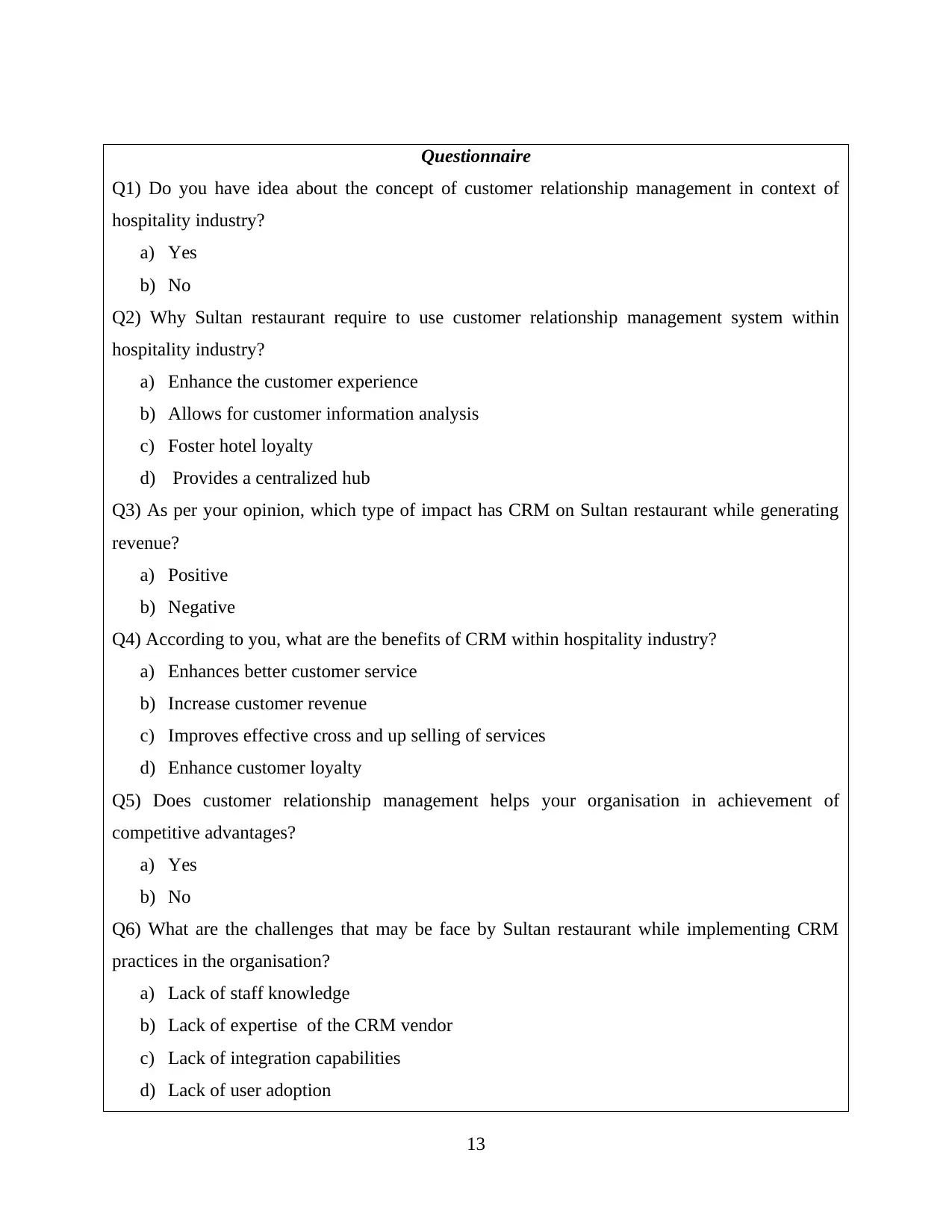
Questionnaire
Q1) Do you have idea about the concept of customer relationship management in context of
hospitality industry?
a) Yes
b) No
Q2) Why Sultan restaurant require to use customer relationship management system within
hospitality industry?
a) Enhance the customer experience
b) Allows for customer information analysis
c) Foster hotel loyalty
d) Provides a centralized hub
Q3) As per your opinion, which type of impact has CRM on Sultan restaurant while generating
revenue?
a) Positive
b) Negative
Q4) According to you, what are the benefits of CRM within hospitality industry?
a) Enhances better customer service
b) Increase customer revenue
c) Improves effective cross and up selling of services
d) Enhance customer loyalty
Q5) Does customer relationship management helps your organisation in achievement of
competitive advantages?
a) Yes
b) No
Q6) What are the challenges that may be face by Sultan restaurant while implementing CRM
practices in the organisation?
a) Lack of staff knowledge
b) Lack of expertise of the CRM vendor
c) Lack of integration capabilities
d) Lack of user adoption
13
Q1) Do you have idea about the concept of customer relationship management in context of
hospitality industry?
a) Yes
b) No
Q2) Why Sultan restaurant require to use customer relationship management system within
hospitality industry?
a) Enhance the customer experience
b) Allows for customer information analysis
c) Foster hotel loyalty
d) Provides a centralized hub
Q3) As per your opinion, which type of impact has CRM on Sultan restaurant while generating
revenue?
a) Positive
b) Negative
Q4) According to you, what are the benefits of CRM within hospitality industry?
a) Enhances better customer service
b) Increase customer revenue
c) Improves effective cross and up selling of services
d) Enhance customer loyalty
Q5) Does customer relationship management helps your organisation in achievement of
competitive advantages?
a) Yes
b) No
Q6) What are the challenges that may be face by Sultan restaurant while implementing CRM
practices in the organisation?
a) Lack of staff knowledge
b) Lack of expertise of the CRM vendor
c) Lack of integration capabilities
d) Lack of user adoption
13
Paraphrase This Document
Need a fresh take? Get an instant paraphrase of this document with our AI Paraphraser
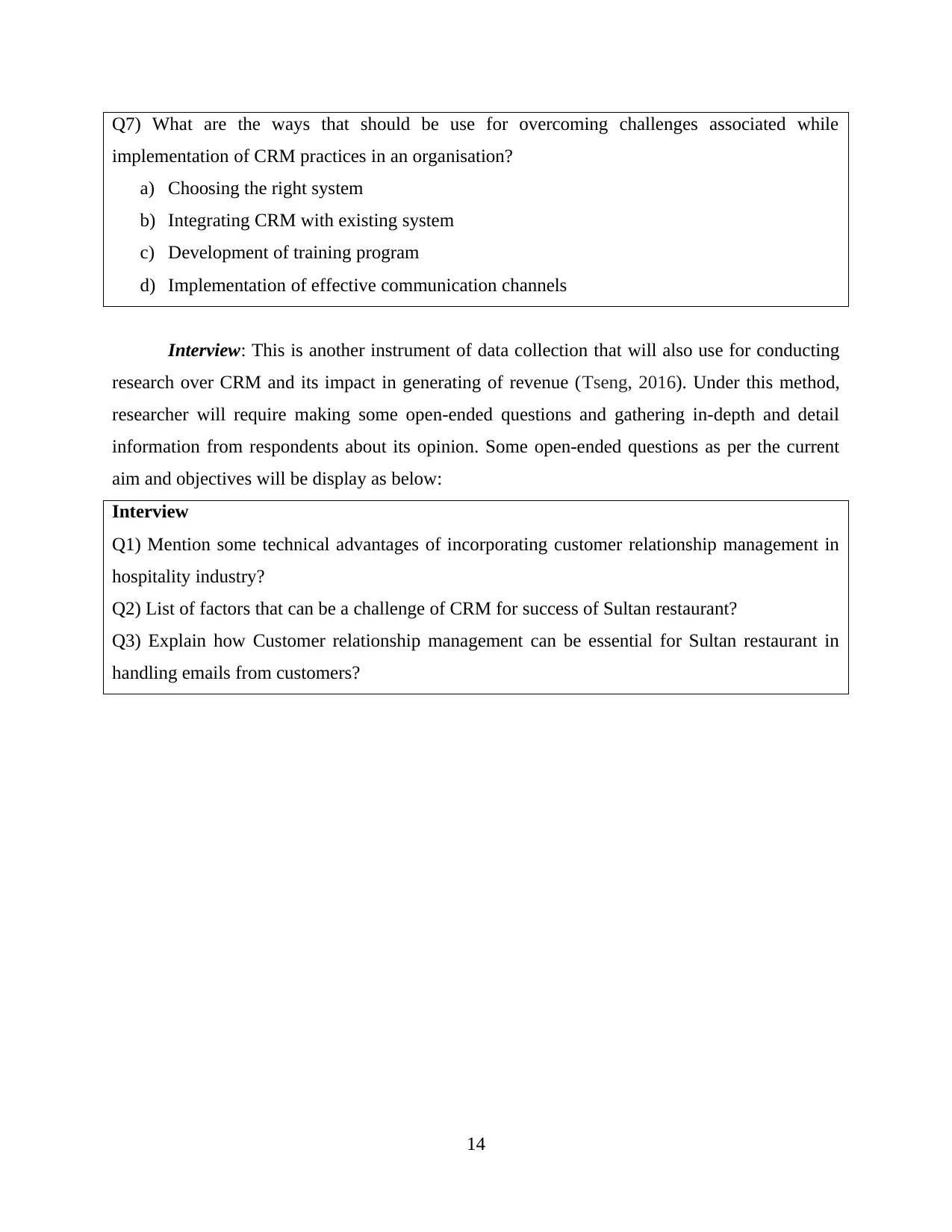
Q7) What are the ways that should be use for overcoming challenges associated while
implementation of CRM practices in an organisation?
a) Choosing the right system
b) Integrating CRM with existing system
c) Development of training program
d) Implementation of effective communication channels
Interview: This is another instrument of data collection that will also use for conducting
research over CRM and its impact in generating of revenue (Tseng, 2016). Under this method,
researcher will require making some open-ended questions and gathering in-depth and detail
information from respondents about its opinion. Some open-ended questions as per the current
aim and objectives will be display as below:
Interview
Q1) Mention some technical advantages of incorporating customer relationship management in
hospitality industry?
Q2) List of factors that can be a challenge of CRM for success of Sultan restaurant?
Q3) Explain how Customer relationship management can be essential for Sultan restaurant in
handling emails from customers?
14
implementation of CRM practices in an organisation?
a) Choosing the right system
b) Integrating CRM with existing system
c) Development of training program
d) Implementation of effective communication channels
Interview: This is another instrument of data collection that will also use for conducting
research over CRM and its impact in generating of revenue (Tseng, 2016). Under this method,
researcher will require making some open-ended questions and gathering in-depth and detail
information from respondents about its opinion. Some open-ended questions as per the current
aim and objectives will be display as below:
Interview
Q1) Mention some technical advantages of incorporating customer relationship management in
hospitality industry?
Q2) List of factors that can be a challenge of CRM for success of Sultan restaurant?
Q3) Explain how Customer relationship management can be essential for Sultan restaurant in
handling emails from customers?
14
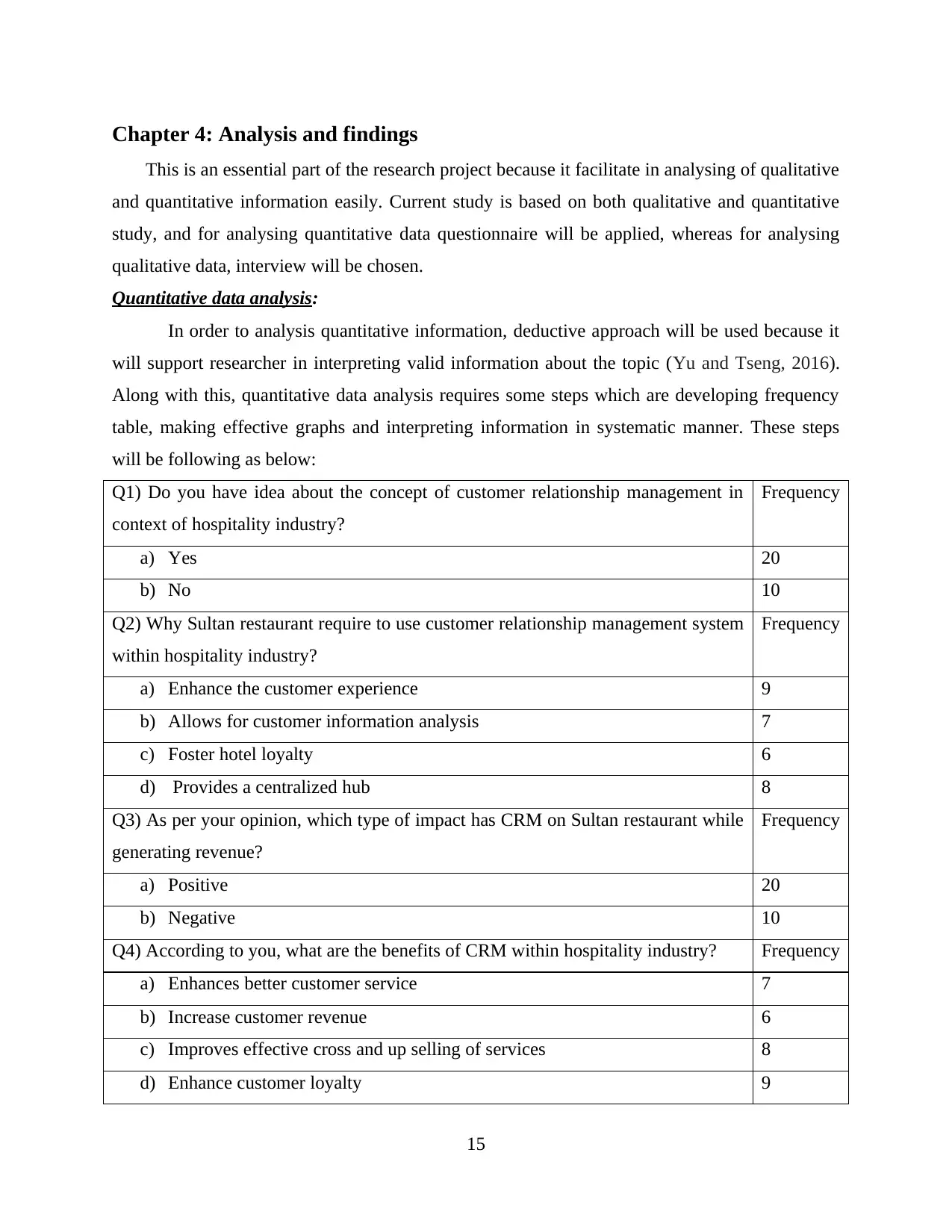
Chapter 4: Analysis and findings
This is an essential part of the research project because it facilitate in analysing of qualitative
and quantitative information easily. Current study is based on both qualitative and quantitative
study, and for analysing quantitative data questionnaire will be applied, whereas for analysing
qualitative data, interview will be chosen.
Quantitative data analysis:
In order to analysis quantitative information, deductive approach will be used because it
will support researcher in interpreting valid information about the topic (Yu and Tseng, 2016).
Along with this, quantitative data analysis requires some steps which are developing frequency
table, making effective graphs and interpreting information in systematic manner. These steps
will be following as below:
Q1) Do you have idea about the concept of customer relationship management in
context of hospitality industry?
Frequency
a) Yes 20
b) No 10
Q2) Why Sultan restaurant require to use customer relationship management system
within hospitality industry?
Frequency
a) Enhance the customer experience 9
b) Allows for customer information analysis 7
c) Foster hotel loyalty 6
d) Provides a centralized hub 8
Q3) As per your opinion, which type of impact has CRM on Sultan restaurant while
generating revenue?
Frequency
a) Positive 20
b) Negative 10
Q4) According to you, what are the benefits of CRM within hospitality industry? Frequency
a) Enhances better customer service 7
b) Increase customer revenue 6
c) Improves effective cross and up selling of services 8
d) Enhance customer loyalty 9
15
This is an essential part of the research project because it facilitate in analysing of qualitative
and quantitative information easily. Current study is based on both qualitative and quantitative
study, and for analysing quantitative data questionnaire will be applied, whereas for analysing
qualitative data, interview will be chosen.
Quantitative data analysis:
In order to analysis quantitative information, deductive approach will be used because it
will support researcher in interpreting valid information about the topic (Yu and Tseng, 2016).
Along with this, quantitative data analysis requires some steps which are developing frequency
table, making effective graphs and interpreting information in systematic manner. These steps
will be following as below:
Q1) Do you have idea about the concept of customer relationship management in
context of hospitality industry?
Frequency
a) Yes 20
b) No 10
Q2) Why Sultan restaurant require to use customer relationship management system
within hospitality industry?
Frequency
a) Enhance the customer experience 9
b) Allows for customer information analysis 7
c) Foster hotel loyalty 6
d) Provides a centralized hub 8
Q3) As per your opinion, which type of impact has CRM on Sultan restaurant while
generating revenue?
Frequency
a) Positive 20
b) Negative 10
Q4) According to you, what are the benefits of CRM within hospitality industry? Frequency
a) Enhances better customer service 7
b) Increase customer revenue 6
c) Improves effective cross and up selling of services 8
d) Enhance customer loyalty 9
15
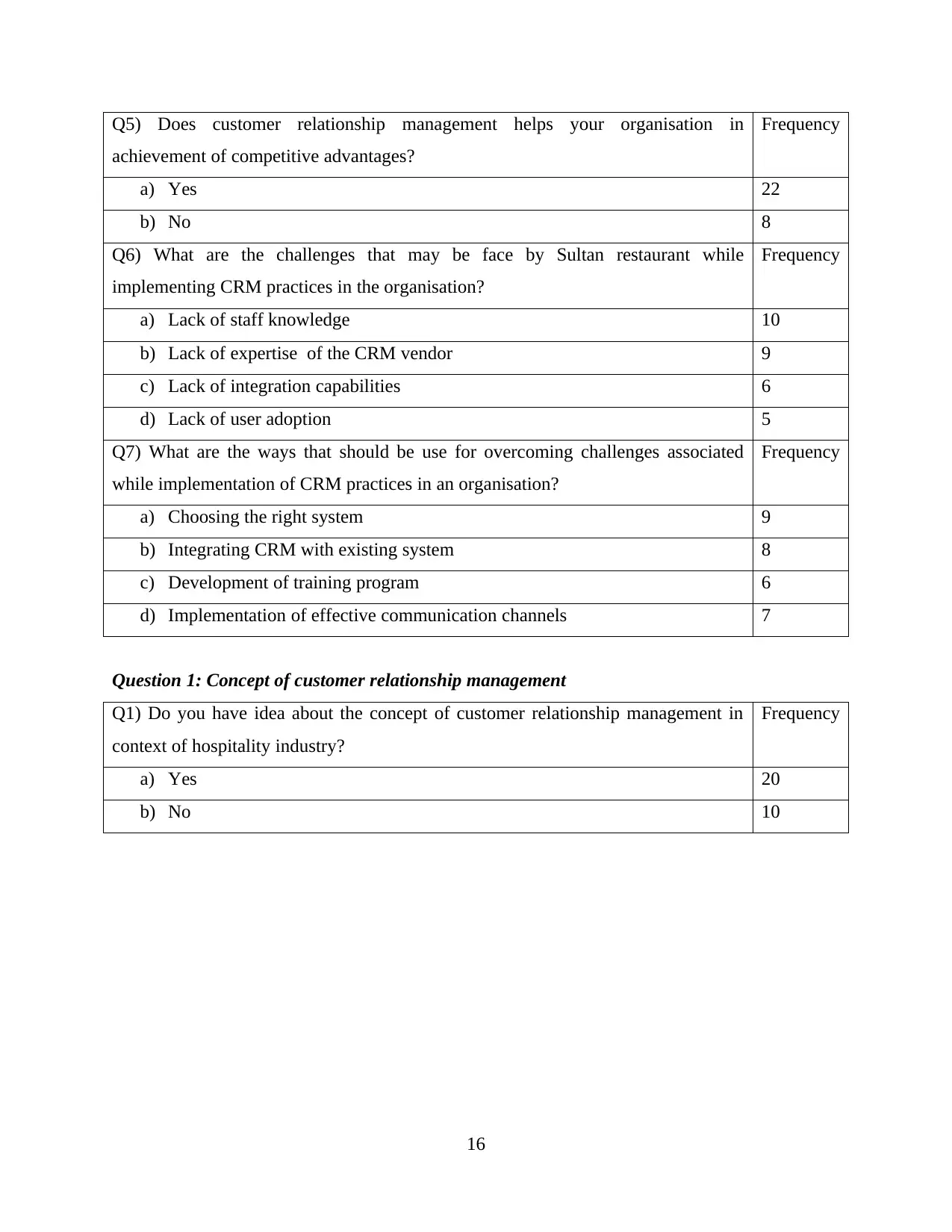
Q5) Does customer relationship management helps your organisation in
achievement of competitive advantages?
Frequency
a) Yes 22
b) No 8
Q6) What are the challenges that may be face by Sultan restaurant while
implementing CRM practices in the organisation?
Frequency
a) Lack of staff knowledge 10
b) Lack of expertise of the CRM vendor 9
c) Lack of integration capabilities 6
d) Lack of user adoption 5
Q7) What are the ways that should be use for overcoming challenges associated
while implementation of CRM practices in an organisation?
Frequency
a) Choosing the right system 9
b) Integrating CRM with existing system 8
c) Development of training program 6
d) Implementation of effective communication channels 7
Question 1: Concept of customer relationship management
Q1) Do you have idea about the concept of customer relationship management in
context of hospitality industry?
Frequency
a) Yes 20
b) No 10
16
achievement of competitive advantages?
Frequency
a) Yes 22
b) No 8
Q6) What are the challenges that may be face by Sultan restaurant while
implementing CRM practices in the organisation?
Frequency
a) Lack of staff knowledge 10
b) Lack of expertise of the CRM vendor 9
c) Lack of integration capabilities 6
d) Lack of user adoption 5
Q7) What are the ways that should be use for overcoming challenges associated
while implementation of CRM practices in an organisation?
Frequency
a) Choosing the right system 9
b) Integrating CRM with existing system 8
c) Development of training program 6
d) Implementation of effective communication channels 7
Question 1: Concept of customer relationship management
Q1) Do you have idea about the concept of customer relationship management in
context of hospitality industry?
Frequency
a) Yes 20
b) No 10
16
Secure Best Marks with AI Grader
Need help grading? Try our AI Grader for instant feedback on your assignments.
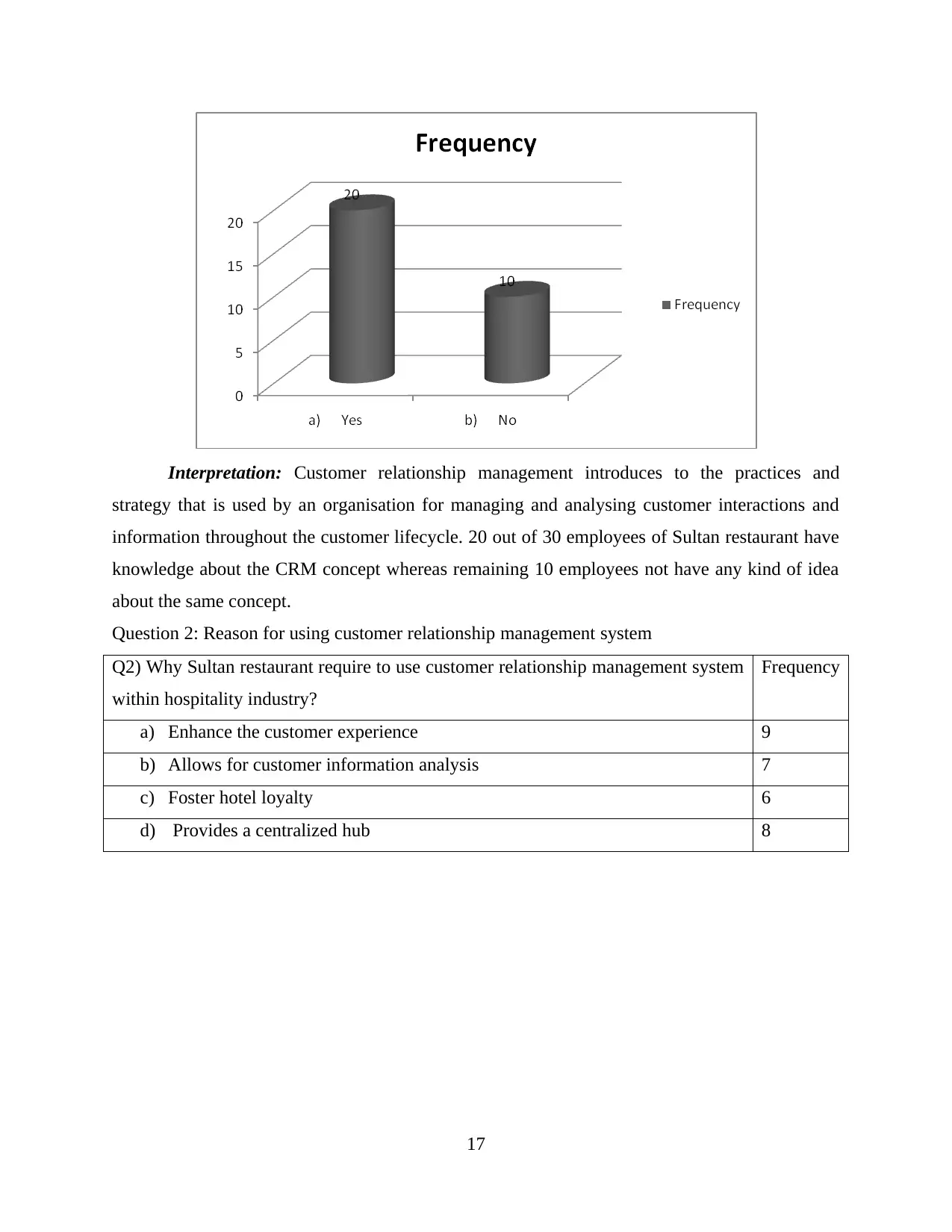
Interpretation: Customer relationship management introduces to the practices and
strategy that is used by an organisation for managing and analysing customer interactions and
information throughout the customer lifecycle. 20 out of 30 employees of Sultan restaurant have
knowledge about the CRM concept whereas remaining 10 employees not have any kind of idea
about the same concept.
Question 2: Reason for using customer relationship management system
Q2) Why Sultan restaurant require to use customer relationship management system
within hospitality industry?
Frequency
a) Enhance the customer experience 9
b) Allows for customer information analysis 7
c) Foster hotel loyalty 6
d) Provides a centralized hub 8
17
strategy that is used by an organisation for managing and analysing customer interactions and
information throughout the customer lifecycle. 20 out of 30 employees of Sultan restaurant have
knowledge about the CRM concept whereas remaining 10 employees not have any kind of idea
about the same concept.
Question 2: Reason for using customer relationship management system
Q2) Why Sultan restaurant require to use customer relationship management system
within hospitality industry?
Frequency
a) Enhance the customer experience 9
b) Allows for customer information analysis 7
c) Foster hotel loyalty 6
d) Provides a centralized hub 8
17
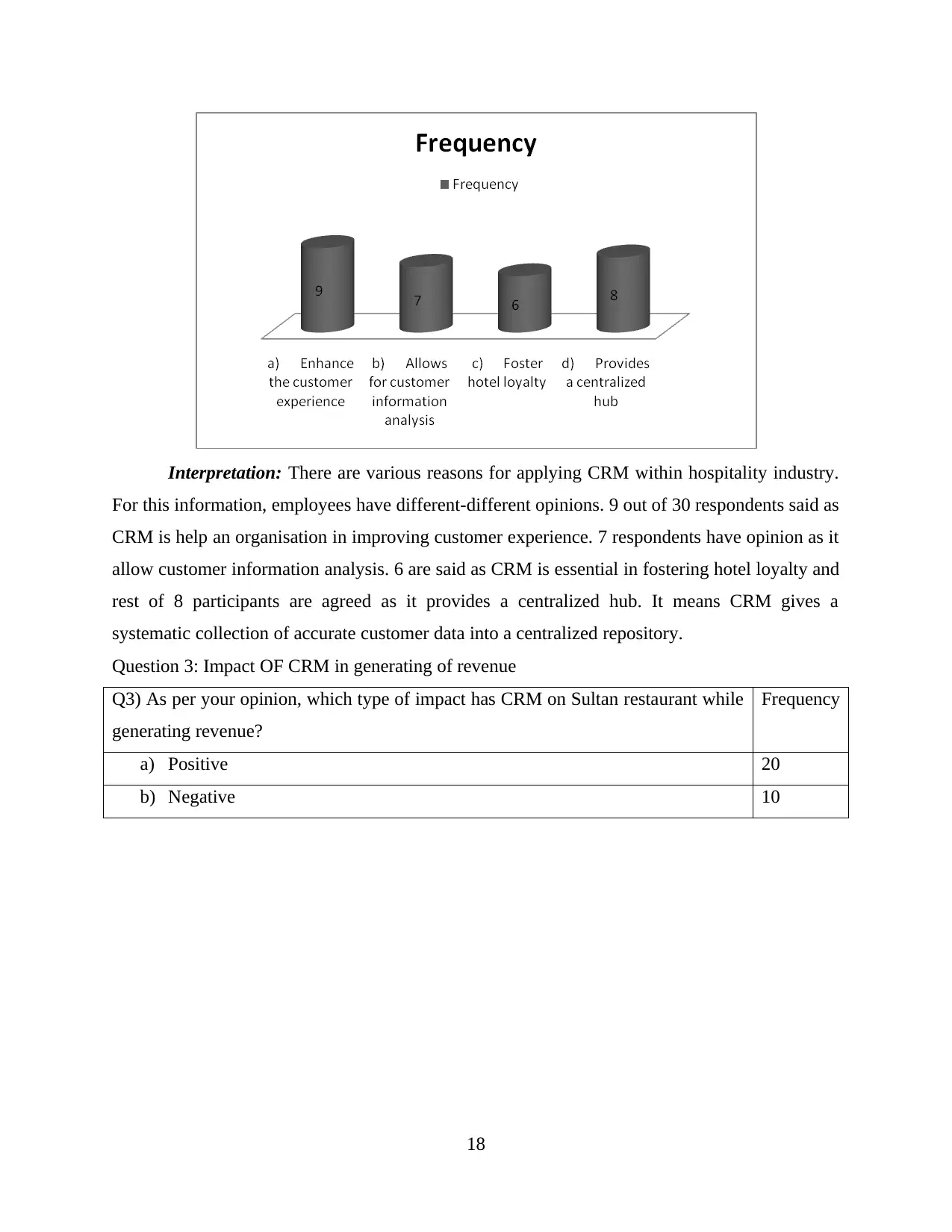
Interpretation: There are various reasons for applying CRM within hospitality industry.
For this information, employees have different-different opinions. 9 out of 30 respondents said as
CRM is help an organisation in improving customer experience. 7 respondents have opinion as it
allow customer information analysis. 6 are said as CRM is essential in fostering hotel loyalty and
rest of 8 participants are agreed as it provides a centralized hub. It means CRM gives a
systematic collection of accurate customer data into a centralized repository.
Question 3: Impact OF CRM in generating of revenue
Q3) As per your opinion, which type of impact has CRM on Sultan restaurant while
generating revenue?
Frequency
a) Positive 20
b) Negative 10
18
For this information, employees have different-different opinions. 9 out of 30 respondents said as
CRM is help an organisation in improving customer experience. 7 respondents have opinion as it
allow customer information analysis. 6 are said as CRM is essential in fostering hotel loyalty and
rest of 8 participants are agreed as it provides a centralized hub. It means CRM gives a
systematic collection of accurate customer data into a centralized repository.
Question 3: Impact OF CRM in generating of revenue
Q3) As per your opinion, which type of impact has CRM on Sultan restaurant while
generating revenue?
Frequency
a) Positive 20
b) Negative 10
18
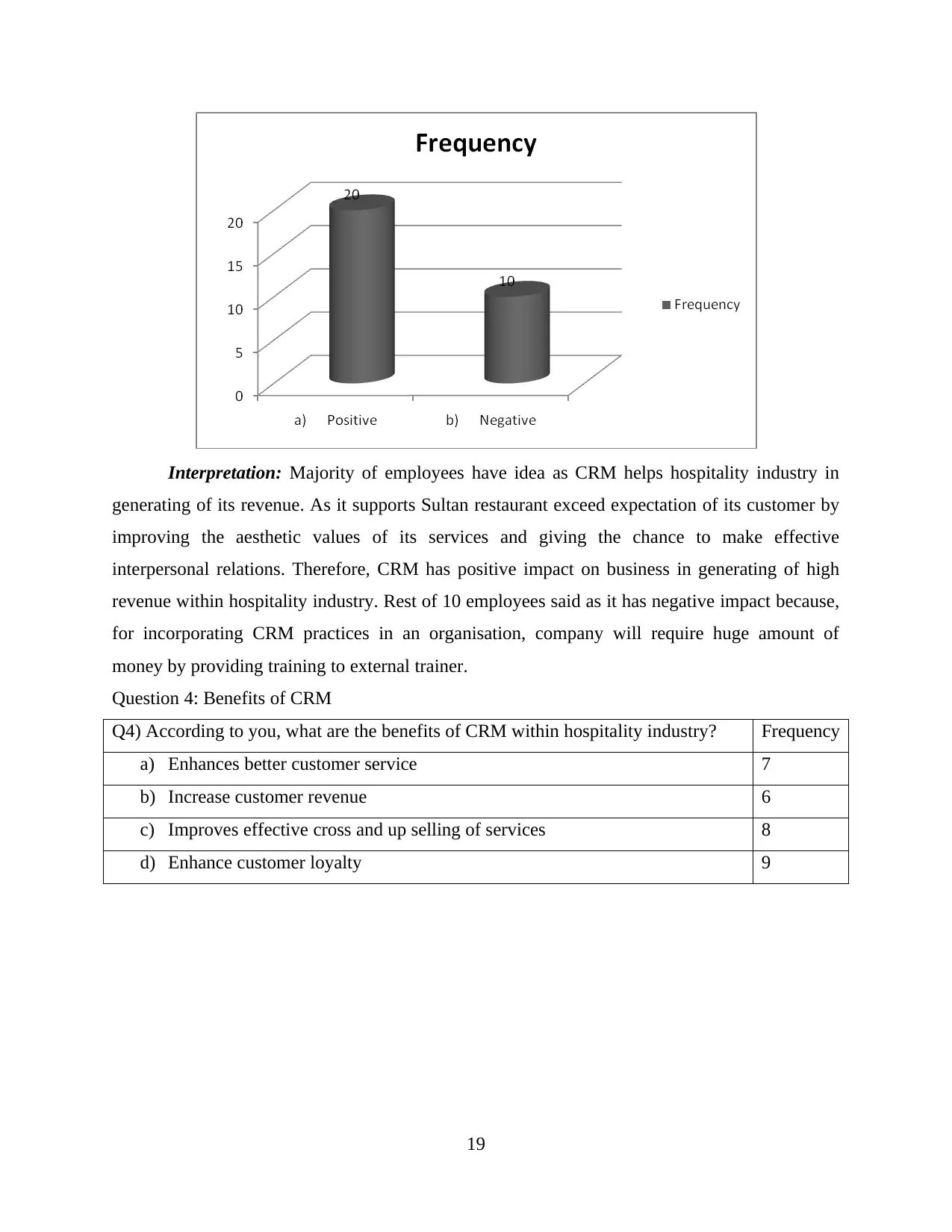
Interpretation: Majority of employees have idea as CRM helps hospitality industry in
generating of its revenue. As it supports Sultan restaurant exceed expectation of its customer by
improving the aesthetic values of its services and giving the chance to make effective
interpersonal relations. Therefore, CRM has positive impact on business in generating of high
revenue within hospitality industry. Rest of 10 employees said as it has negative impact because,
for incorporating CRM practices in an organisation, company will require huge amount of
money by providing training to external trainer.
Question 4: Benefits of CRM
Q4) According to you, what are the benefits of CRM within hospitality industry? Frequency
a) Enhances better customer service 7
b) Increase customer revenue 6
c) Improves effective cross and up selling of services 8
d) Enhance customer loyalty 9
19
generating of its revenue. As it supports Sultan restaurant exceed expectation of its customer by
improving the aesthetic values of its services and giving the chance to make effective
interpersonal relations. Therefore, CRM has positive impact on business in generating of high
revenue within hospitality industry. Rest of 10 employees said as it has negative impact because,
for incorporating CRM practices in an organisation, company will require huge amount of
money by providing training to external trainer.
Question 4: Benefits of CRM
Q4) According to you, what are the benefits of CRM within hospitality industry? Frequency
a) Enhances better customer service 7
b) Increase customer revenue 6
c) Improves effective cross and up selling of services 8
d) Enhance customer loyalty 9
19
Paraphrase This Document
Need a fresh take? Get an instant paraphrase of this document with our AI Paraphraser
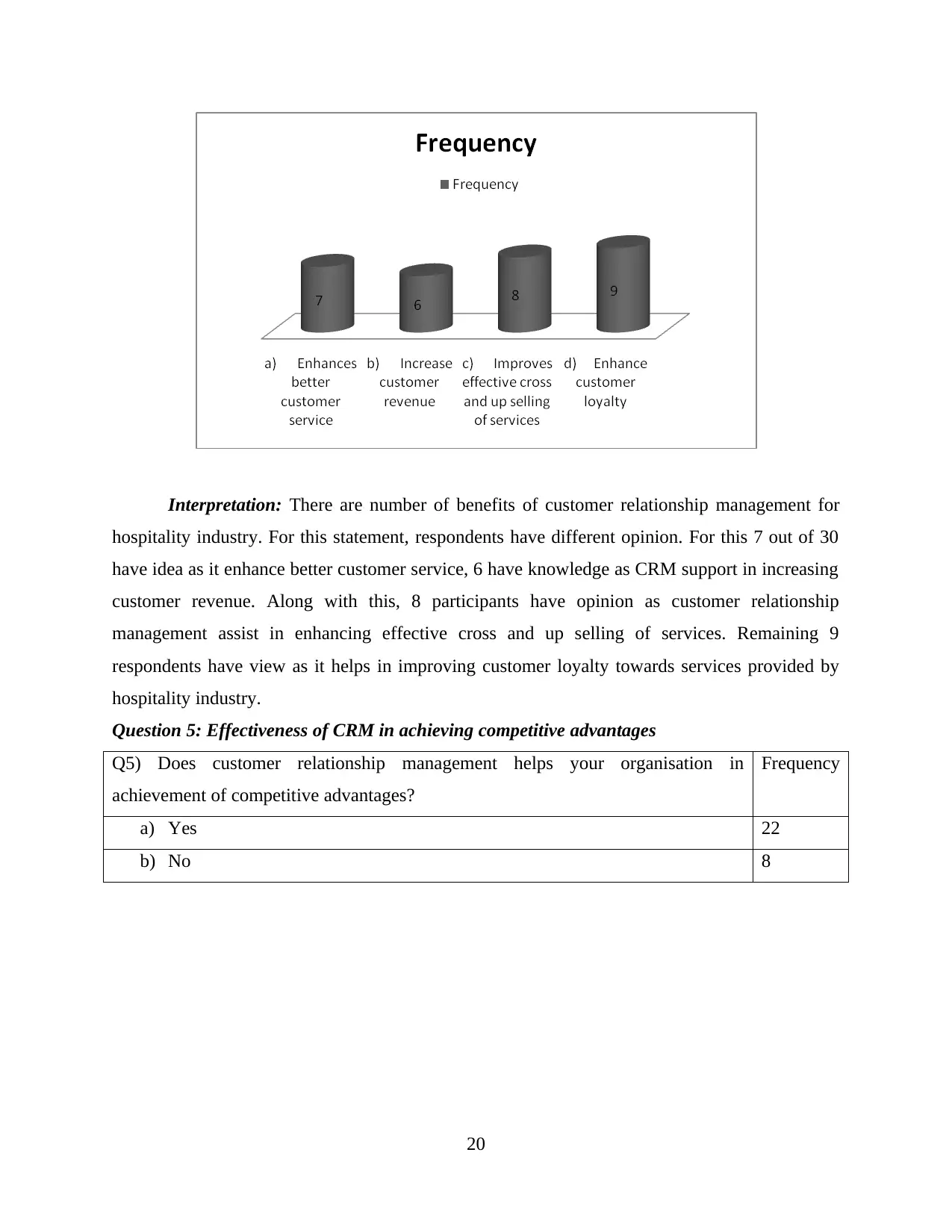
Interpretation: There are number of benefits of customer relationship management for
hospitality industry. For this statement, respondents have different opinion. For this 7 out of 30
have idea as it enhance better customer service, 6 have knowledge as CRM support in increasing
customer revenue. Along with this, 8 participants have opinion as customer relationship
management assist in enhancing effective cross and up selling of services. Remaining 9
respondents have view as it helps in improving customer loyalty towards services provided by
hospitality industry.
Question 5: Effectiveness of CRM in achieving competitive advantages
Q5) Does customer relationship management helps your organisation in
achievement of competitive advantages?
Frequency
a) Yes 22
b) No 8
20
hospitality industry. For this statement, respondents have different opinion. For this 7 out of 30
have idea as it enhance better customer service, 6 have knowledge as CRM support in increasing
customer revenue. Along with this, 8 participants have opinion as customer relationship
management assist in enhancing effective cross and up selling of services. Remaining 9
respondents have view as it helps in improving customer loyalty towards services provided by
hospitality industry.
Question 5: Effectiveness of CRM in achieving competitive advantages
Q5) Does customer relationship management helps your organisation in
achievement of competitive advantages?
Frequency
a) Yes 22
b) No 8
20
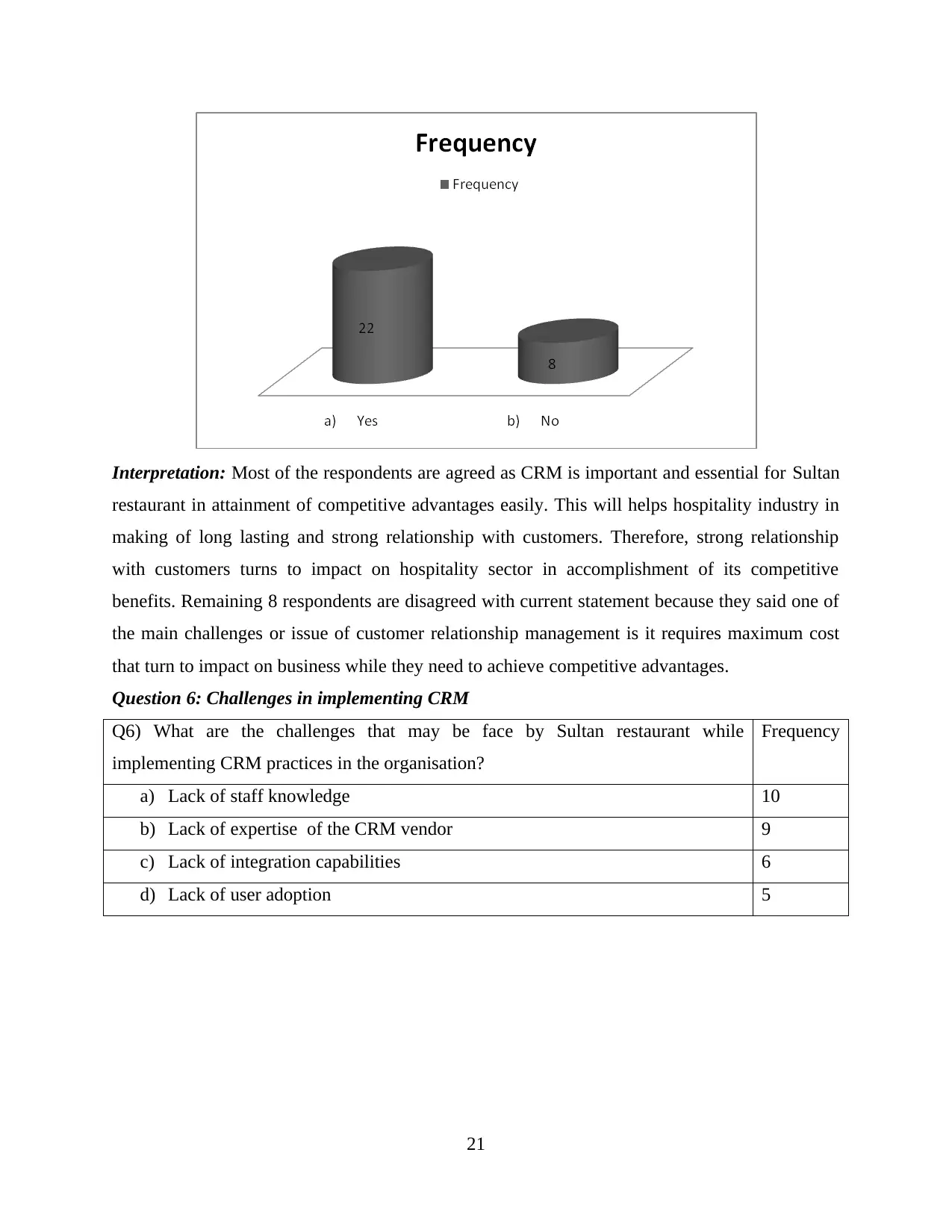
Interpretation: Most of the respondents are agreed as CRM is important and essential for Sultan
restaurant in attainment of competitive advantages easily. This will helps hospitality industry in
making of long lasting and strong relationship with customers. Therefore, strong relationship
with customers turns to impact on hospitality sector in accomplishment of its competitive
benefits. Remaining 8 respondents are disagreed with current statement because they said one of
the main challenges or issue of customer relationship management is it requires maximum cost
that turn to impact on business while they need to achieve competitive advantages.
Question 6: Challenges in implementing CRM
Q6) What are the challenges that may be face by Sultan restaurant while
implementing CRM practices in the organisation?
Frequency
a) Lack of staff knowledge 10
b) Lack of expertise of the CRM vendor 9
c) Lack of integration capabilities 6
d) Lack of user adoption 5
21
restaurant in attainment of competitive advantages easily. This will helps hospitality industry in
making of long lasting and strong relationship with customers. Therefore, strong relationship
with customers turns to impact on hospitality sector in accomplishment of its competitive
benefits. Remaining 8 respondents are disagreed with current statement because they said one of
the main challenges or issue of customer relationship management is it requires maximum cost
that turn to impact on business while they need to achieve competitive advantages.
Question 6: Challenges in implementing CRM
Q6) What are the challenges that may be face by Sultan restaurant while
implementing CRM practices in the organisation?
Frequency
a) Lack of staff knowledge 10
b) Lack of expertise of the CRM vendor 9
c) Lack of integration capabilities 6
d) Lack of user adoption 5
21
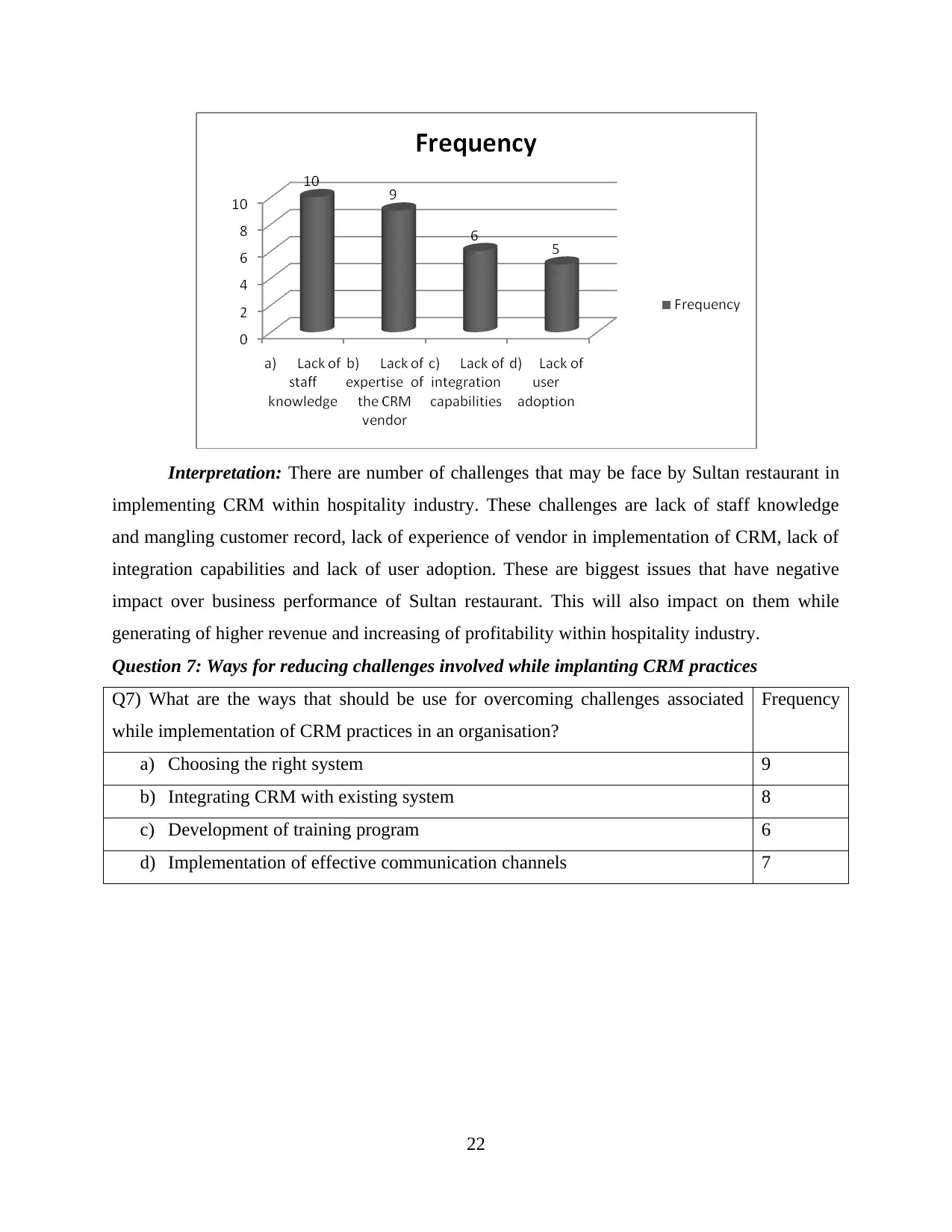
Interpretation: There are number of challenges that may be face by Sultan restaurant in
implementing CRM within hospitality industry. These challenges are lack of staff knowledge
and mangling customer record, lack of experience of vendor in implementation of CRM, lack of
integration capabilities and lack of user adoption. These are biggest issues that have negative
impact over business performance of Sultan restaurant. This will also impact on them while
generating of higher revenue and increasing of profitability within hospitality industry.
Question 7: Ways for reducing challenges involved while implanting CRM practices
Q7) What are the ways that should be use for overcoming challenges associated
while implementation of CRM practices in an organisation?
Frequency
a) Choosing the right system 9
b) Integrating CRM with existing system 8
c) Development of training program 6
d) Implementation of effective communication channels 7
22
implementing CRM within hospitality industry. These challenges are lack of staff knowledge
and mangling customer record, lack of experience of vendor in implementation of CRM, lack of
integration capabilities and lack of user adoption. These are biggest issues that have negative
impact over business performance of Sultan restaurant. This will also impact on them while
generating of higher revenue and increasing of profitability within hospitality industry.
Question 7: Ways for reducing challenges involved while implanting CRM practices
Q7) What are the ways that should be use for overcoming challenges associated
while implementation of CRM practices in an organisation?
Frequency
a) Choosing the right system 9
b) Integrating CRM with existing system 8
c) Development of training program 6
d) Implementation of effective communication channels 7
22
Secure Best Marks with AI Grader
Need help grading? Try our AI Grader for instant feedback on your assignments.
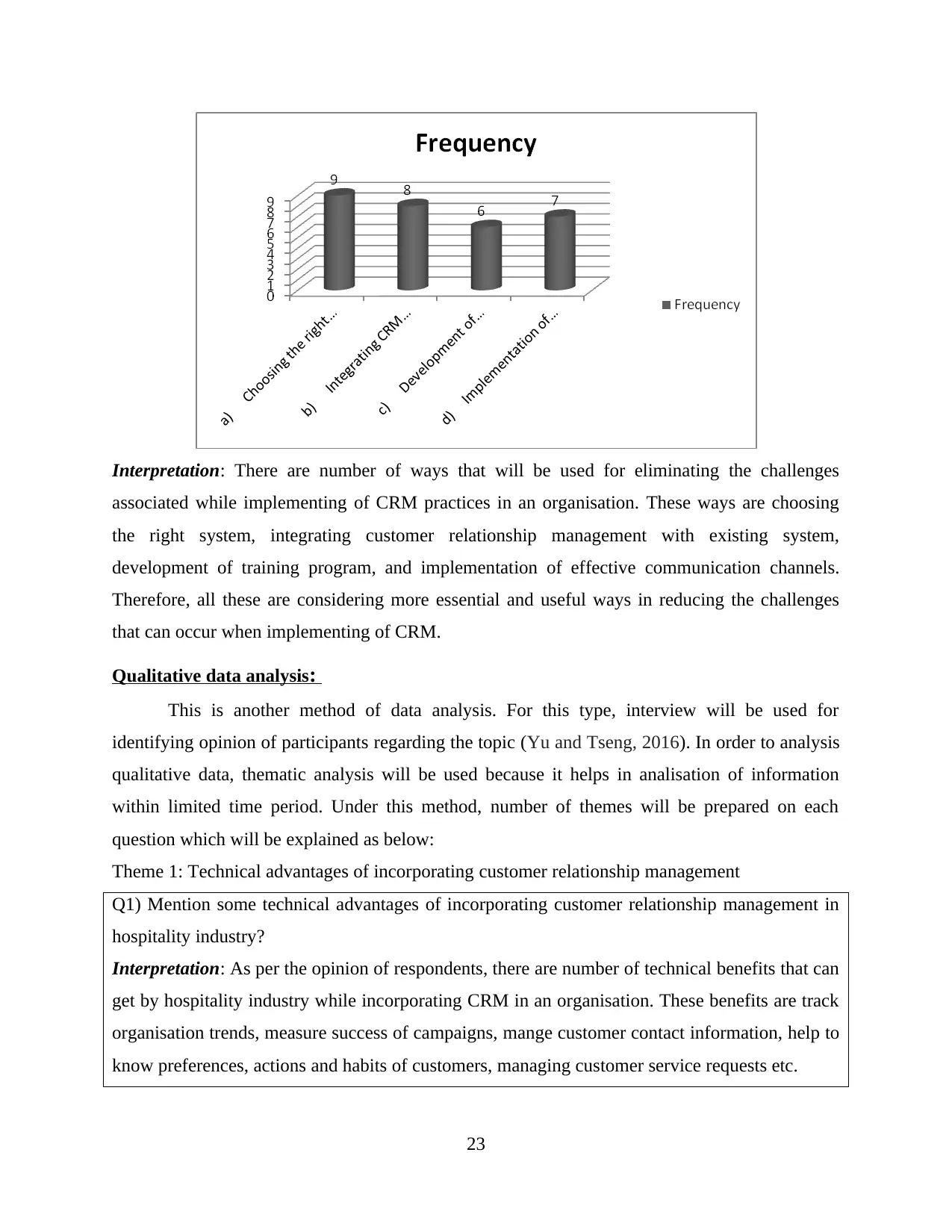
Interpretation: There are number of ways that will be used for eliminating the challenges
associated while implementing of CRM practices in an organisation. These ways are choosing
the right system, integrating customer relationship management with existing system,
development of training program, and implementation of effective communication channels.
Therefore, all these are considering more essential and useful ways in reducing the challenges
that can occur when implementing of CRM.
Qualitative data analysis:
This is another method of data analysis. For this type, interview will be used for
identifying opinion of participants regarding the topic (Yu and Tseng, 2016). In order to analysis
qualitative data, thematic analysis will be used because it helps in analisation of information
within limited time period. Under this method, number of themes will be prepared on each
question which will be explained as below:
Theme 1: Technical advantages of incorporating customer relationship management
Q1) Mention some technical advantages of incorporating customer relationship management in
hospitality industry?
Interpretation: As per the opinion of respondents, there are number of technical benefits that can
get by hospitality industry while incorporating CRM in an organisation. These benefits are track
organisation trends, measure success of campaigns, mange customer contact information, help to
know preferences, actions and habits of customers, managing customer service requests etc.
23
associated while implementing of CRM practices in an organisation. These ways are choosing
the right system, integrating customer relationship management with existing system,
development of training program, and implementation of effective communication channels.
Therefore, all these are considering more essential and useful ways in reducing the challenges
that can occur when implementing of CRM.
Qualitative data analysis:
This is another method of data analysis. For this type, interview will be used for
identifying opinion of participants regarding the topic (Yu and Tseng, 2016). In order to analysis
qualitative data, thematic analysis will be used because it helps in analisation of information
within limited time period. Under this method, number of themes will be prepared on each
question which will be explained as below:
Theme 1: Technical advantages of incorporating customer relationship management
Q1) Mention some technical advantages of incorporating customer relationship management in
hospitality industry?
Interpretation: As per the opinion of respondents, there are number of technical benefits that can
get by hospitality industry while incorporating CRM in an organisation. These benefits are track
organisation trends, measure success of campaigns, mange customer contact information, help to
know preferences, actions and habits of customers, managing customer service requests etc.
23
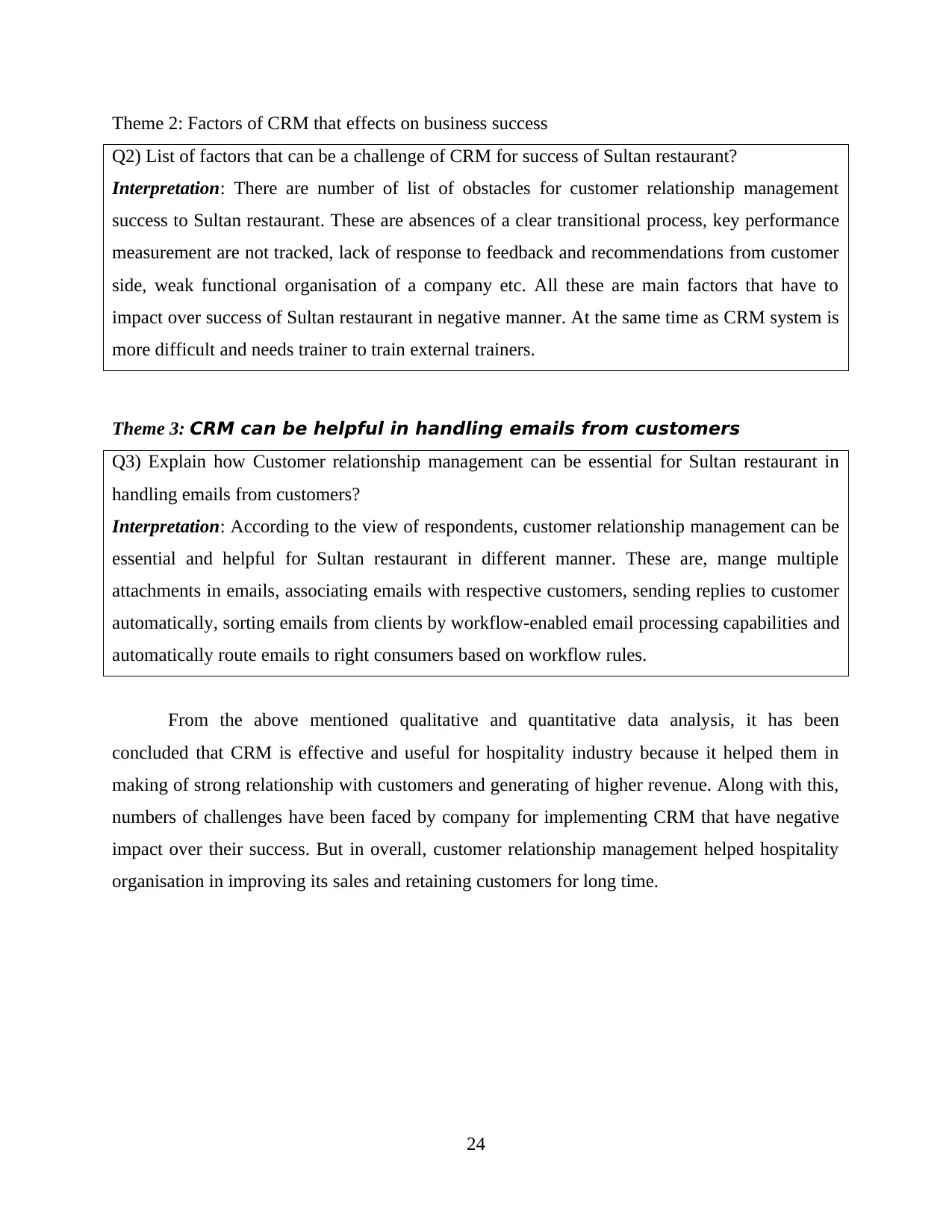
Theme 2: Factors of CRM that effects on business success
Q2) List of factors that can be a challenge of CRM for success of Sultan restaurant?
Interpretation: There are number of list of obstacles for customer relationship management
success to Sultan restaurant. These are absences of a clear transitional process, key performance
measurement are not tracked, lack of response to feedback and recommendations from customer
side, weak functional organisation of a company etc. All these are main factors that have to
impact over success of Sultan restaurant in negative manner. At the same time as CRM system is
more difficult and needs trainer to train external trainers.
Theme 3: CRM can be helpful in handling emails from customers
Q3) Explain how Customer relationship management can be essential for Sultan restaurant in
handling emails from customers?
Interpretation: According to the view of respondents, customer relationship management can be
essential and helpful for Sultan restaurant in different manner. These are, mange multiple
attachments in emails, associating emails with respective customers, sending replies to customer
automatically, sorting emails from clients by workflow-enabled email processing capabilities and
automatically route emails to right consumers based on workflow rules.
From the above mentioned qualitative and quantitative data analysis, it has been
concluded that CRM is effective and useful for hospitality industry because it helped them in
making of strong relationship with customers and generating of higher revenue. Along with this,
numbers of challenges have been faced by company for implementing CRM that have negative
impact over their success. But in overall, customer relationship management helped hospitality
organisation in improving its sales and retaining customers for long time.
24
Q2) List of factors that can be a challenge of CRM for success of Sultan restaurant?
Interpretation: There are number of list of obstacles for customer relationship management
success to Sultan restaurant. These are absences of a clear transitional process, key performance
measurement are not tracked, lack of response to feedback and recommendations from customer
side, weak functional organisation of a company etc. All these are main factors that have to
impact over success of Sultan restaurant in negative manner. At the same time as CRM system is
more difficult and needs trainer to train external trainers.
Theme 3: CRM can be helpful in handling emails from customers
Q3) Explain how Customer relationship management can be essential for Sultan restaurant in
handling emails from customers?
Interpretation: According to the view of respondents, customer relationship management can be
essential and helpful for Sultan restaurant in different manner. These are, mange multiple
attachments in emails, associating emails with respective customers, sending replies to customer
automatically, sorting emails from clients by workflow-enabled email processing capabilities and
automatically route emails to right consumers based on workflow rules.
From the above mentioned qualitative and quantitative data analysis, it has been
concluded that CRM is effective and useful for hospitality industry because it helped them in
making of strong relationship with customers and generating of higher revenue. Along with this,
numbers of challenges have been faced by company for implementing CRM that have negative
impact over their success. But in overall, customer relationship management helped hospitality
organisation in improving its sales and retaining customers for long time.
24
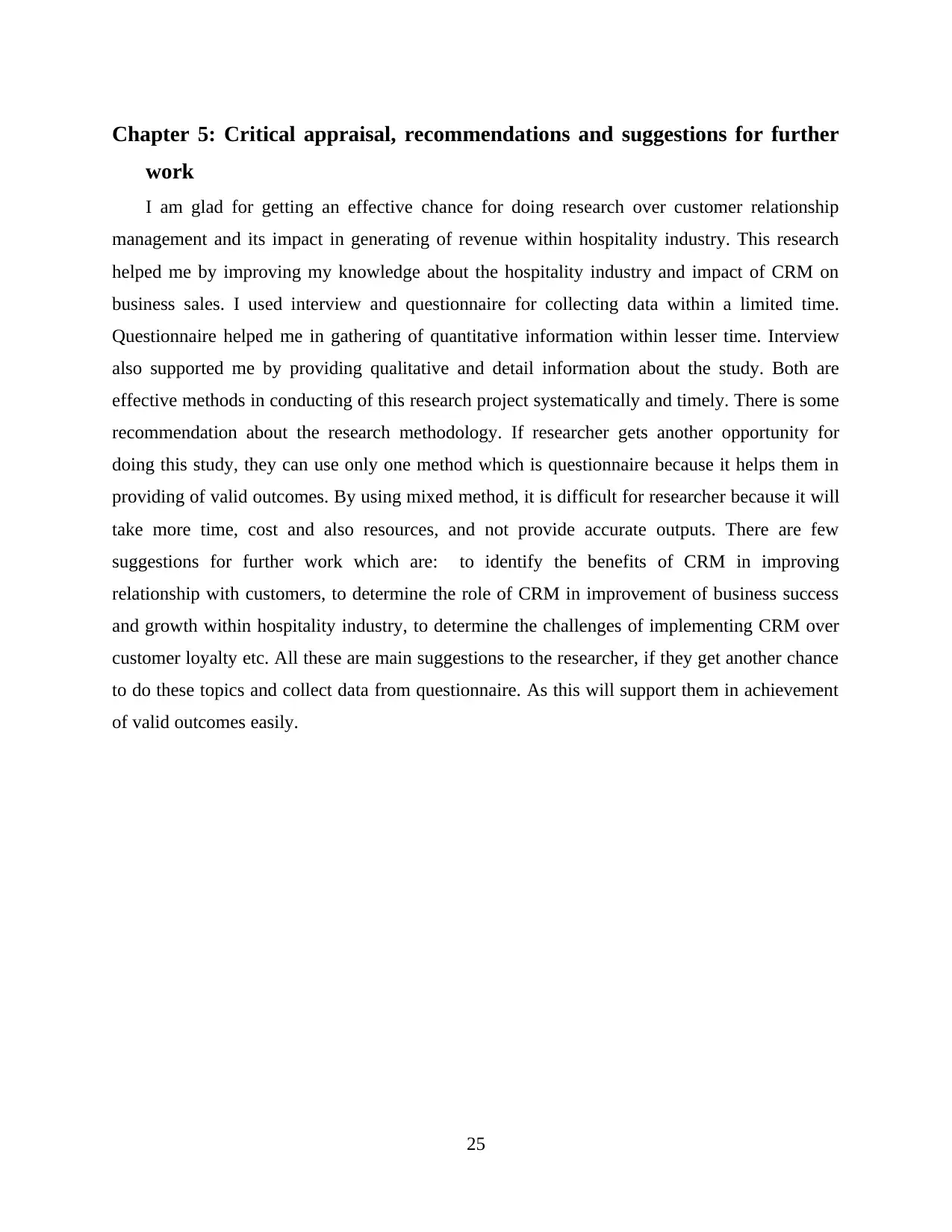
Chapter 5: Critical appraisal, recommendations and suggestions for further
work
I am glad for getting an effective chance for doing research over customer relationship
management and its impact in generating of revenue within hospitality industry. This research
helped me by improving my knowledge about the hospitality industry and impact of CRM on
business sales. I used interview and questionnaire for collecting data within a limited time.
Questionnaire helped me in gathering of quantitative information within lesser time. Interview
also supported me by providing qualitative and detail information about the study. Both are
effective methods in conducting of this research project systematically and timely. There is some
recommendation about the research methodology. If researcher gets another opportunity for
doing this study, they can use only one method which is questionnaire because it helps them in
providing of valid outcomes. By using mixed method, it is difficult for researcher because it will
take more time, cost and also resources, and not provide accurate outputs. There are few
suggestions for further work which are: to identify the benefits of CRM in improving
relationship with customers, to determine the role of CRM in improvement of business success
and growth within hospitality industry, to determine the challenges of implementing CRM over
customer loyalty etc. All these are main suggestions to the researcher, if they get another chance
to do these topics and collect data from questionnaire. As this will support them in achievement
of valid outcomes easily.
25
work
I am glad for getting an effective chance for doing research over customer relationship
management and its impact in generating of revenue within hospitality industry. This research
helped me by improving my knowledge about the hospitality industry and impact of CRM on
business sales. I used interview and questionnaire for collecting data within a limited time.
Questionnaire helped me in gathering of quantitative information within lesser time. Interview
also supported me by providing qualitative and detail information about the study. Both are
effective methods in conducting of this research project systematically and timely. There is some
recommendation about the research methodology. If researcher gets another opportunity for
doing this study, they can use only one method which is questionnaire because it helps them in
providing of valid outcomes. By using mixed method, it is difficult for researcher because it will
take more time, cost and also resources, and not provide accurate outputs. There are few
suggestions for further work which are: to identify the benefits of CRM in improving
relationship with customers, to determine the role of CRM in improvement of business success
and growth within hospitality industry, to determine the challenges of implementing CRM over
customer loyalty etc. All these are main suggestions to the researcher, if they get another chance
to do these topics and collect data from questionnaire. As this will support them in achievement
of valid outcomes easily.
25
Paraphrase This Document
Need a fresh take? Get an instant paraphrase of this document with our AI Paraphraser
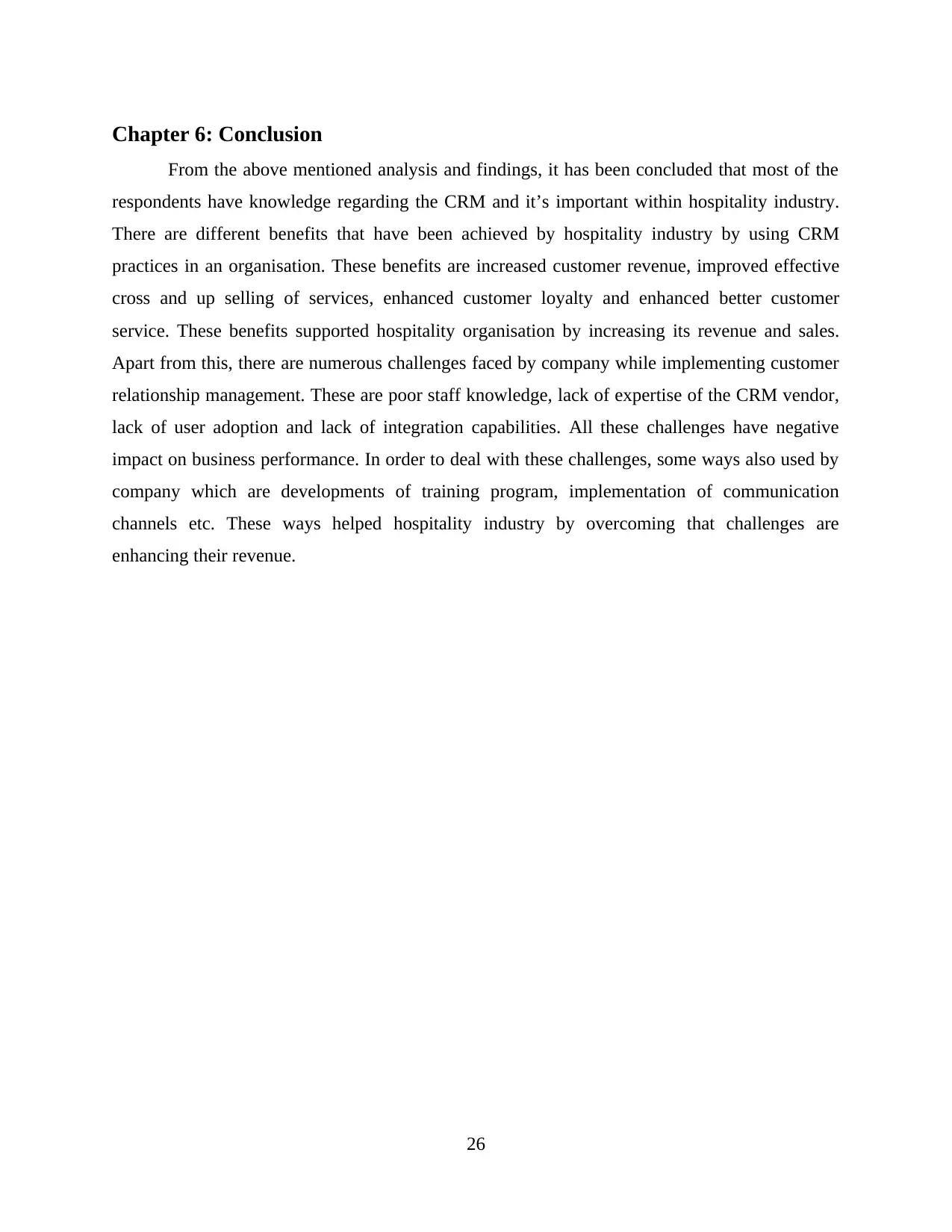
Chapter 6: Conclusion
From the above mentioned analysis and findings, it has been concluded that most of the
respondents have knowledge regarding the CRM and it’s important within hospitality industry.
There are different benefits that have been achieved by hospitality industry by using CRM
practices in an organisation. These benefits are increased customer revenue, improved effective
cross and up selling of services, enhanced customer loyalty and enhanced better customer
service. These benefits supported hospitality organisation by increasing its revenue and sales.
Apart from this, there are numerous challenges faced by company while implementing customer
relationship management. These are poor staff knowledge, lack of expertise of the CRM vendor,
lack of user adoption and lack of integration capabilities. All these challenges have negative
impact on business performance. In order to deal with these challenges, some ways also used by
company which are developments of training program, implementation of communication
channels etc. These ways helped hospitality industry by overcoming that challenges are
enhancing their revenue.
26
From the above mentioned analysis and findings, it has been concluded that most of the
respondents have knowledge regarding the CRM and it’s important within hospitality industry.
There are different benefits that have been achieved by hospitality industry by using CRM
practices in an organisation. These benefits are increased customer revenue, improved effective
cross and up selling of services, enhanced customer loyalty and enhanced better customer
service. These benefits supported hospitality organisation by increasing its revenue and sales.
Apart from this, there are numerous challenges faced by company while implementing customer
relationship management. These are poor staff knowledge, lack of expertise of the CRM vendor,
lack of user adoption and lack of integration capabilities. All these challenges have negative
impact on business performance. In order to deal with these challenges, some ways also used by
company which are developments of training program, implementation of communication
channels etc. These ways helped hospitality industry by overcoming that challenges are
enhancing their revenue.
26
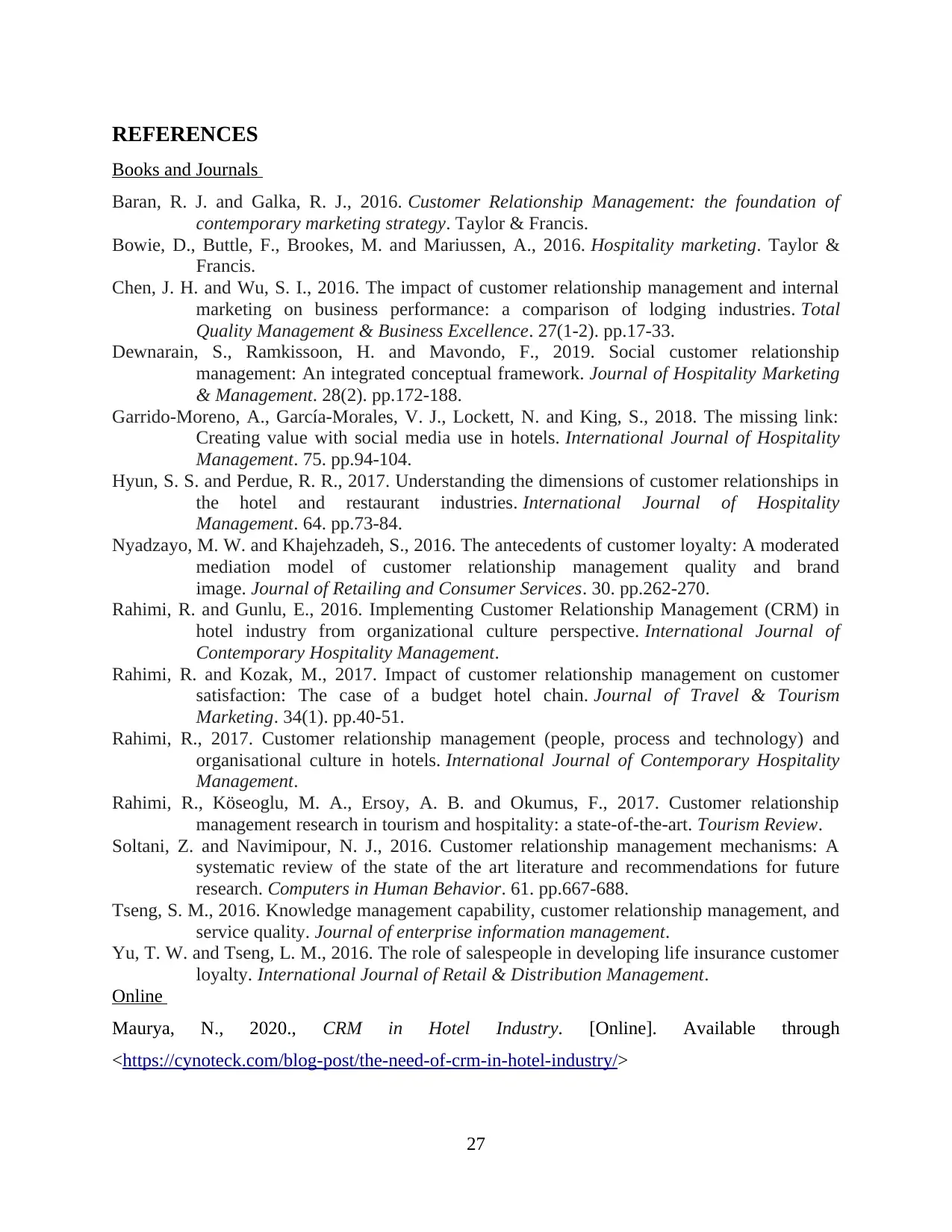
REFERENCES
Books and Journals
Baran, R. J. and Galka, R. J., 2016. Customer Relationship Management: the foundation of
contemporary marketing strategy. Taylor & Francis.
Bowie, D., Buttle, F., Brookes, M. and Mariussen, A., 2016. Hospitality marketing. Taylor &
Francis.
Chen, J. H. and Wu, S. I., 2016. The impact of customer relationship management and internal
marketing on business performance: a comparison of lodging industries. Total
Quality Management & Business Excellence. 27(1-2). pp.17-33.
Dewnarain, S., Ramkissoon, H. and Mavondo, F., 2019. Social customer relationship
management: An integrated conceptual framework. Journal of Hospitality Marketing
& Management. 28(2). pp.172-188.
Garrido-Moreno, A., García-Morales, V. J., Lockett, N. and King, S., 2018. The missing link:
Creating value with social media use in hotels. International Journal of Hospitality
Management. 75. pp.94-104.
Hyun, S. S. and Perdue, R. R., 2017. Understanding the dimensions of customer relationships in
the hotel and restaurant industries. International Journal of Hospitality
Management. 64. pp.73-84.
Nyadzayo, M. W. and Khajehzadeh, S., 2016. The antecedents of customer loyalty: A moderated
mediation model of customer relationship management quality and brand
image. Journal of Retailing and Consumer Services. 30. pp.262-270.
Rahimi, R. and Gunlu, E., 2016. Implementing Customer Relationship Management (CRM) in
hotel industry from organizational culture perspective. International Journal of
Contemporary Hospitality Management.
Rahimi, R. and Kozak, M., 2017. Impact of customer relationship management on customer
satisfaction: The case of a budget hotel chain. Journal of Travel & Tourism
Marketing. 34(1). pp.40-51.
Rahimi, R., 2017. Customer relationship management (people, process and technology) and
organisational culture in hotels. International Journal of Contemporary Hospitality
Management.
Rahimi, R., Köseoglu, M. A., Ersoy, A. B. and Okumus, F., 2017. Customer relationship
management research in tourism and hospitality: a state-of-the-art. Tourism Review.
Soltani, Z. and Navimipour, N. J., 2016. Customer relationship management mechanisms: A
systematic review of the state of the art literature and recommendations for future
research. Computers in Human Behavior. 61. pp.667-688.
Tseng, S. M., 2016. Knowledge management capability, customer relationship management, and
service quality. Journal of enterprise information management.
Yu, T. W. and Tseng, L. M., 2016. The role of salespeople in developing life insurance customer
loyalty. International Journal of Retail & Distribution Management.
Online
Maurya, N., 2020., CRM in Hotel Industry. [Online]. Available through
<https://cynoteck.com/blog-post/the-need-of-crm-in-hotel-industry/>
27
Books and Journals
Baran, R. J. and Galka, R. J., 2016. Customer Relationship Management: the foundation of
contemporary marketing strategy. Taylor & Francis.
Bowie, D., Buttle, F., Brookes, M. and Mariussen, A., 2016. Hospitality marketing. Taylor &
Francis.
Chen, J. H. and Wu, S. I., 2016. The impact of customer relationship management and internal
marketing on business performance: a comparison of lodging industries. Total
Quality Management & Business Excellence. 27(1-2). pp.17-33.
Dewnarain, S., Ramkissoon, H. and Mavondo, F., 2019. Social customer relationship
management: An integrated conceptual framework. Journal of Hospitality Marketing
& Management. 28(2). pp.172-188.
Garrido-Moreno, A., García-Morales, V. J., Lockett, N. and King, S., 2018. The missing link:
Creating value with social media use in hotels. International Journal of Hospitality
Management. 75. pp.94-104.
Hyun, S. S. and Perdue, R. R., 2017. Understanding the dimensions of customer relationships in
the hotel and restaurant industries. International Journal of Hospitality
Management. 64. pp.73-84.
Nyadzayo, M. W. and Khajehzadeh, S., 2016. The antecedents of customer loyalty: A moderated
mediation model of customer relationship management quality and brand
image. Journal of Retailing and Consumer Services. 30. pp.262-270.
Rahimi, R. and Gunlu, E., 2016. Implementing Customer Relationship Management (CRM) in
hotel industry from organizational culture perspective. International Journal of
Contemporary Hospitality Management.
Rahimi, R. and Kozak, M., 2017. Impact of customer relationship management on customer
satisfaction: The case of a budget hotel chain. Journal of Travel & Tourism
Marketing. 34(1). pp.40-51.
Rahimi, R., 2017. Customer relationship management (people, process and technology) and
organisational culture in hotels. International Journal of Contemporary Hospitality
Management.
Rahimi, R., Köseoglu, M. A., Ersoy, A. B. and Okumus, F., 2017. Customer relationship
management research in tourism and hospitality: a state-of-the-art. Tourism Review.
Soltani, Z. and Navimipour, N. J., 2016. Customer relationship management mechanisms: A
systematic review of the state of the art literature and recommendations for future
research. Computers in Human Behavior. 61. pp.667-688.
Tseng, S. M., 2016. Knowledge management capability, customer relationship management, and
service quality. Journal of enterprise information management.
Yu, T. W. and Tseng, L. M., 2016. The role of salespeople in developing life insurance customer
loyalty. International Journal of Retail & Distribution Management.
Online
Maurya, N., 2020., CRM in Hotel Industry. [Online]. Available through
<https://cynoteck.com/blog-post/the-need-of-crm-in-hotel-industry/>
27
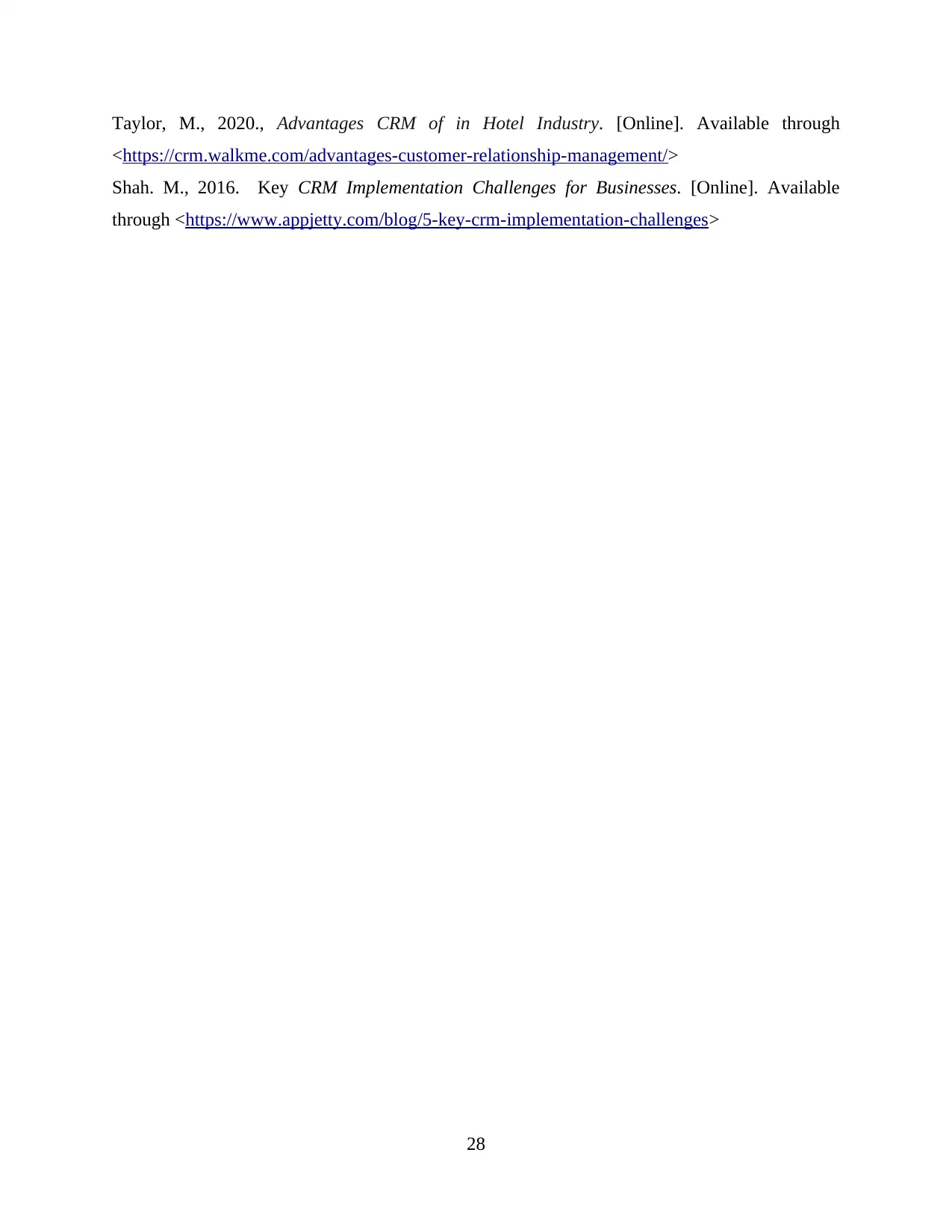
Taylor, M., 2020., Advantages CRM of in Hotel Industry. [Online]. Available through
<https://crm.walkme.com/advantages-customer-relationship-management/>
Shah. M., 2016. Key CRM Implementation Challenges for Businesses. [Online]. Available
through <https://www.appjetty.com/blog/5-key-crm-implementation-challenges>
28
<https://crm.walkme.com/advantages-customer-relationship-management/>
Shah. M., 2016. Key CRM Implementation Challenges for Businesses. [Online]. Available
through <https://www.appjetty.com/blog/5-key-crm-implementation-challenges>
28
1 out of 28
Related Documents
Your All-in-One AI-Powered Toolkit for Academic Success.
+13062052269
info@desklib.com
Available 24*7 on WhatsApp / Email
![[object Object]](/_next/static/media/star-bottom.7253800d.svg)
Unlock your academic potential
© 2024 | Zucol Services PVT LTD | All rights reserved.




